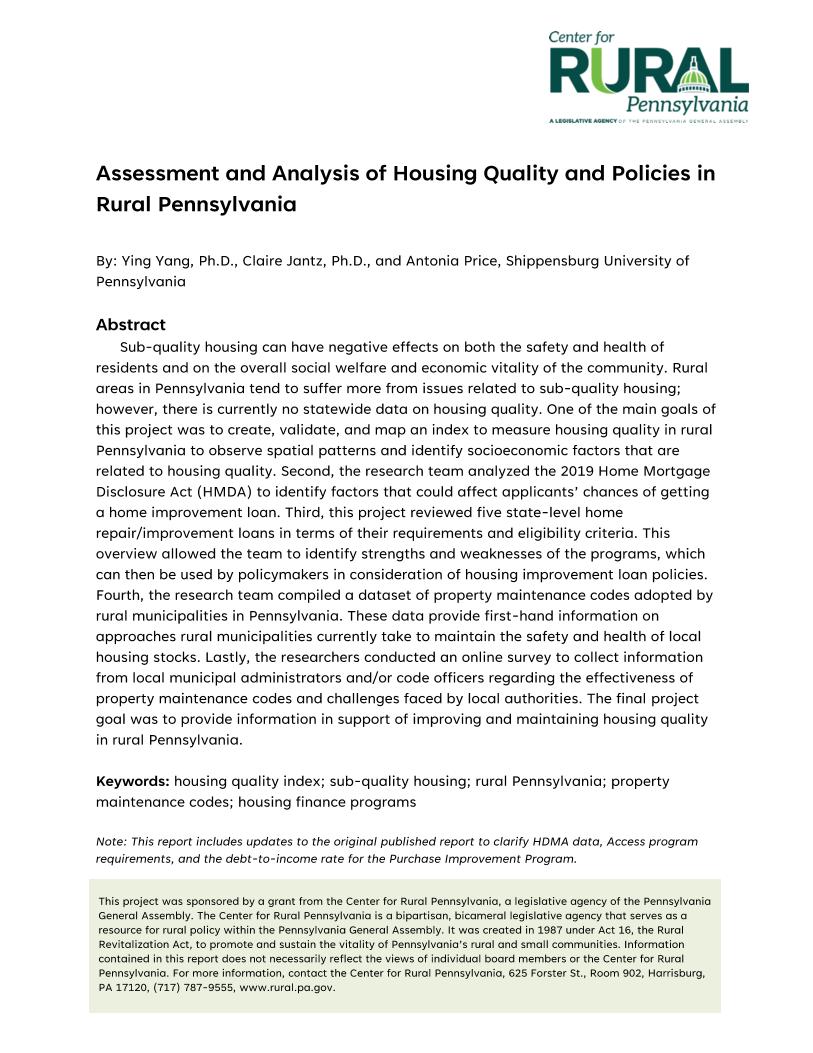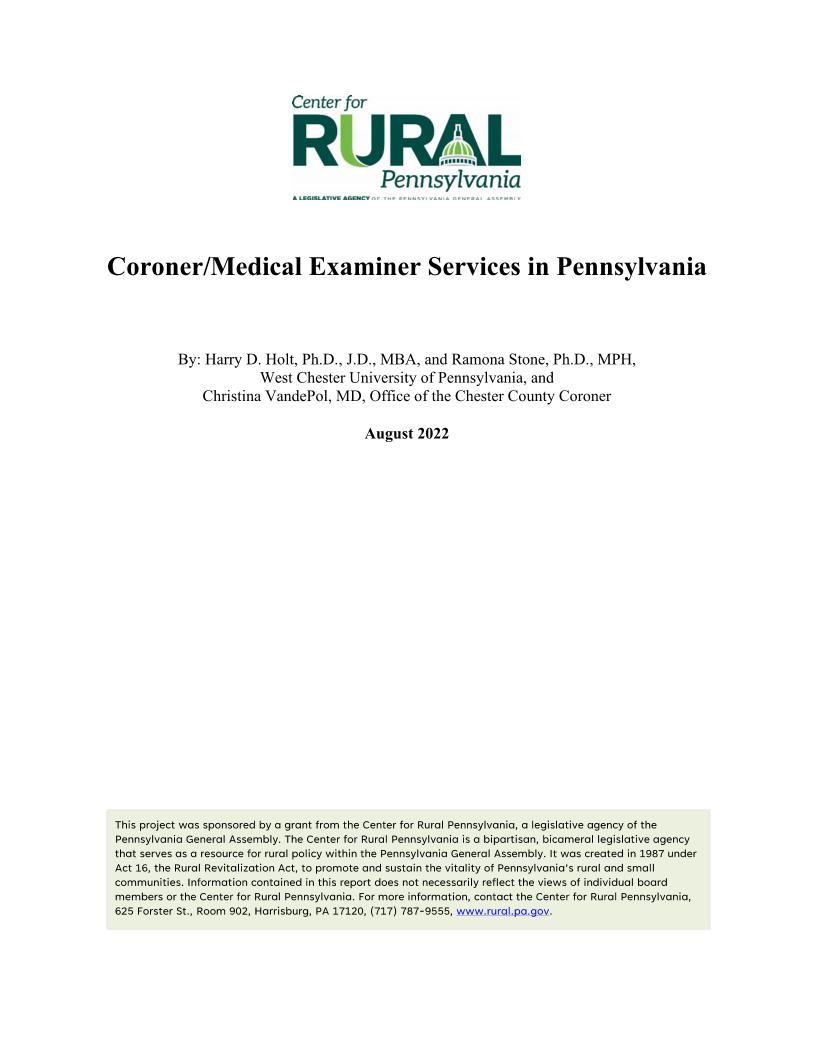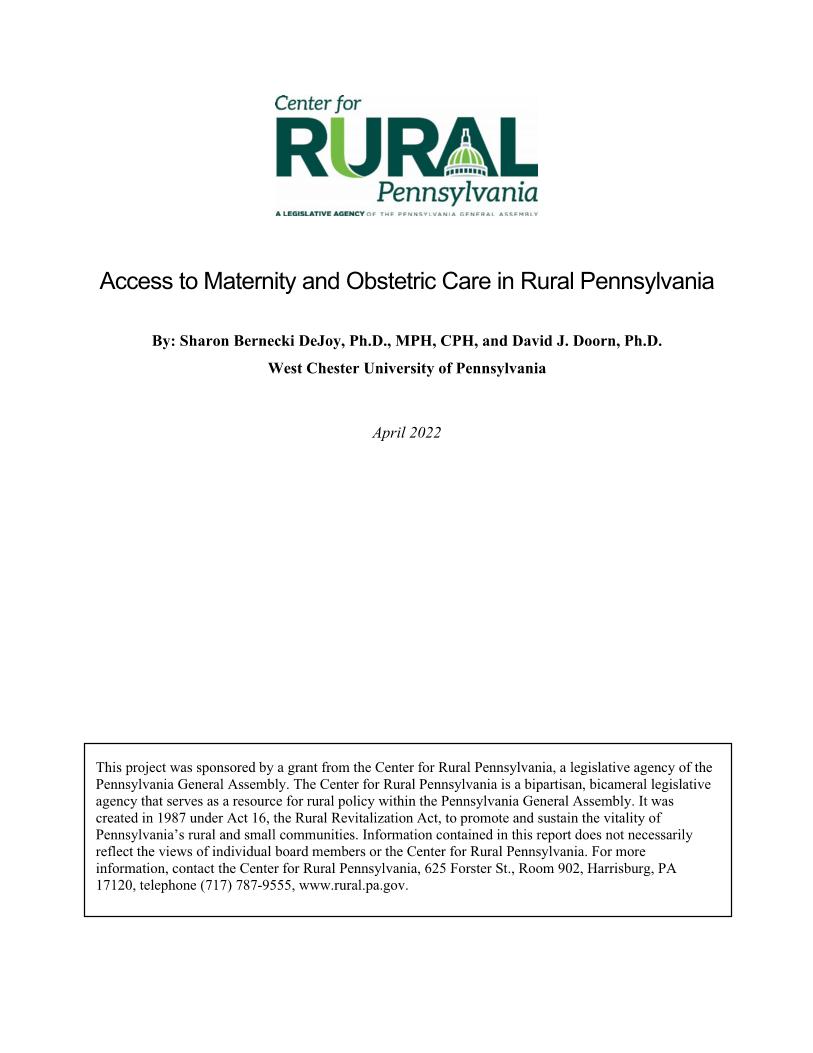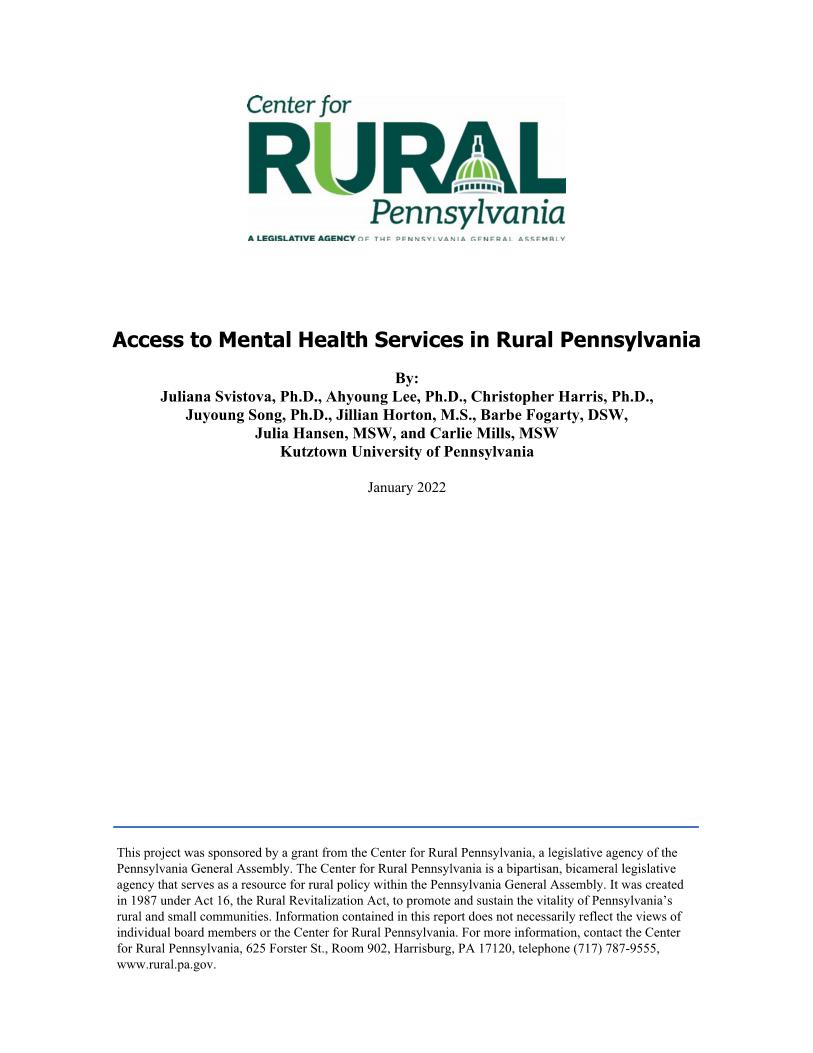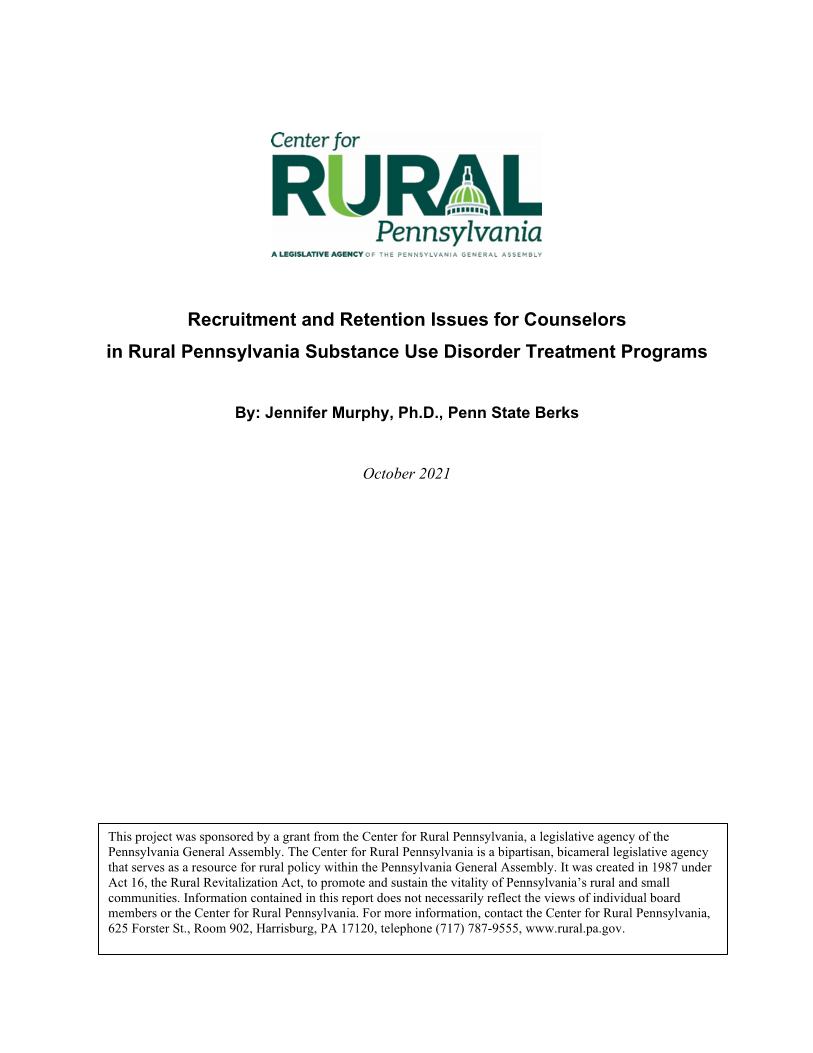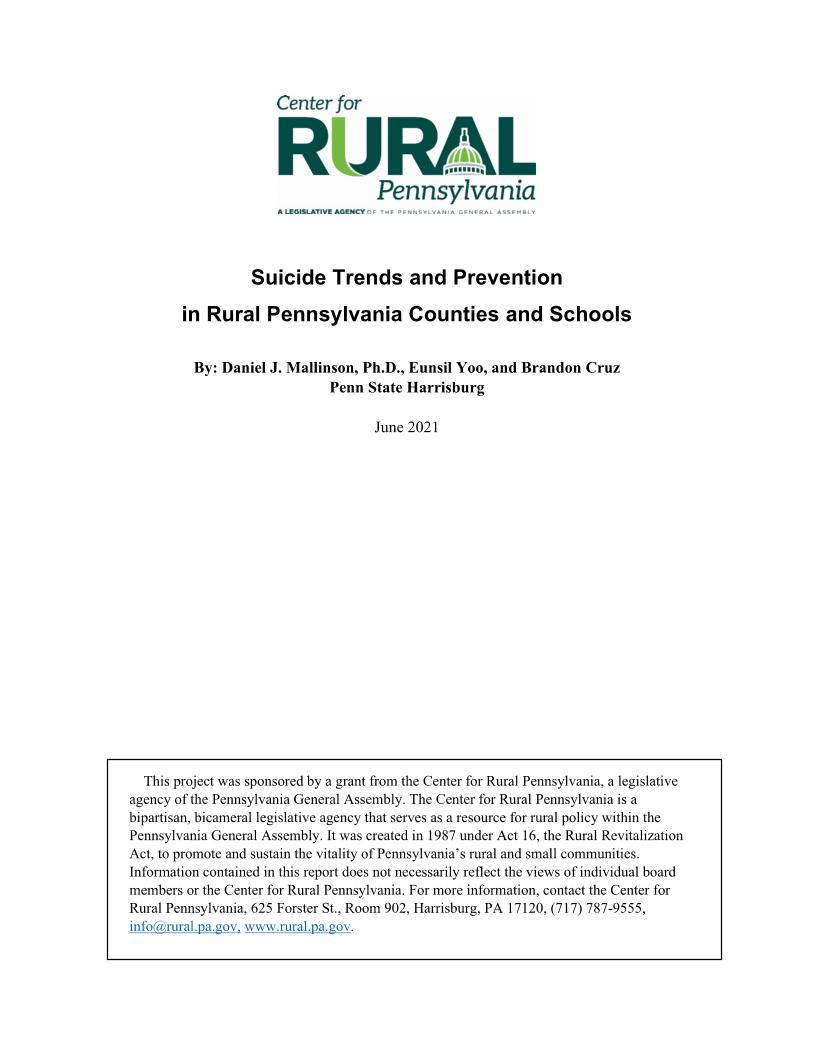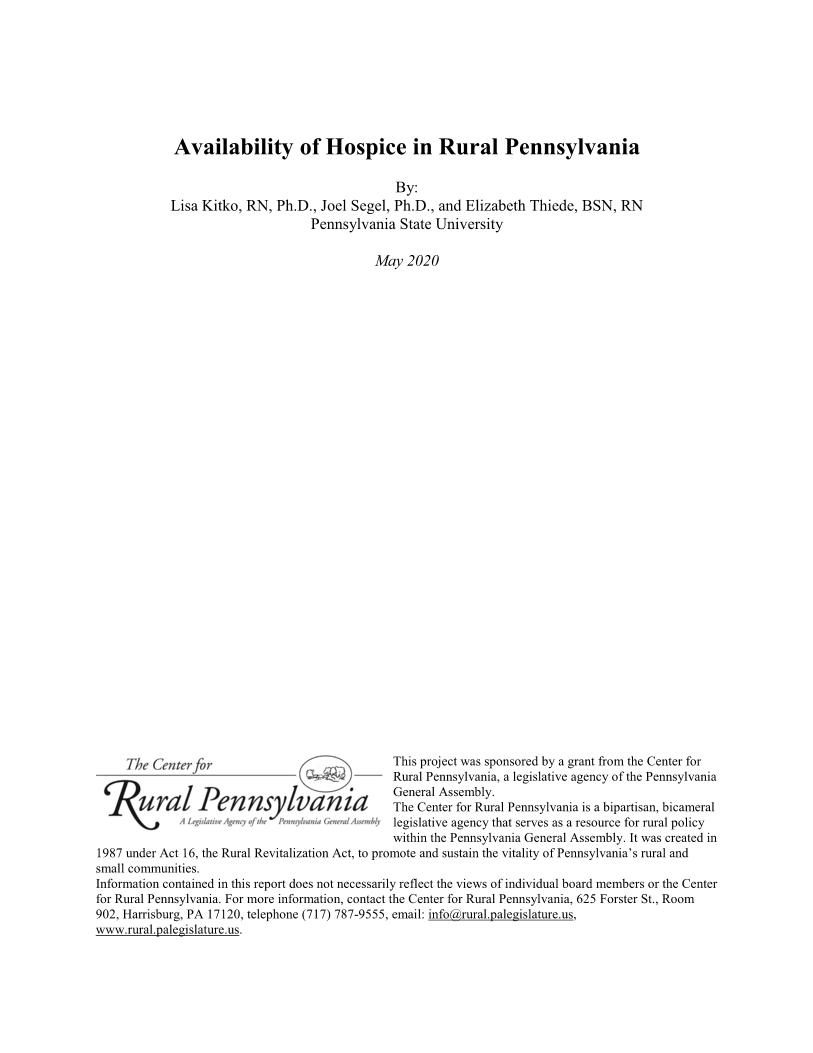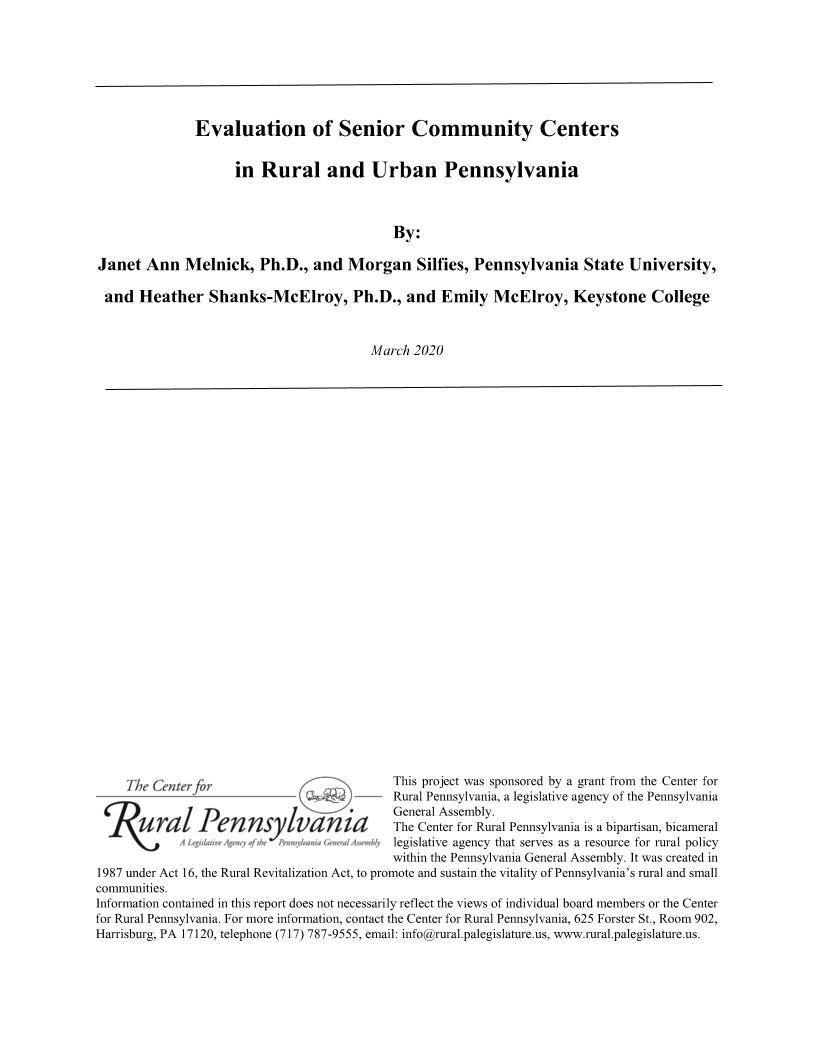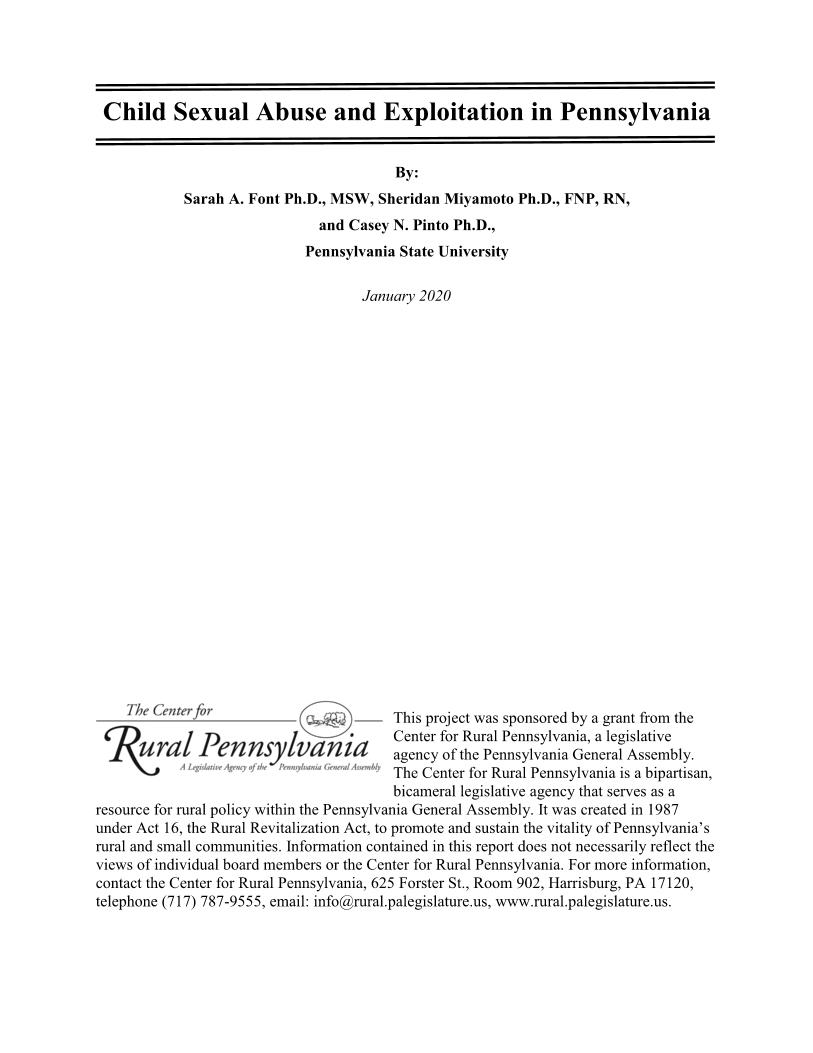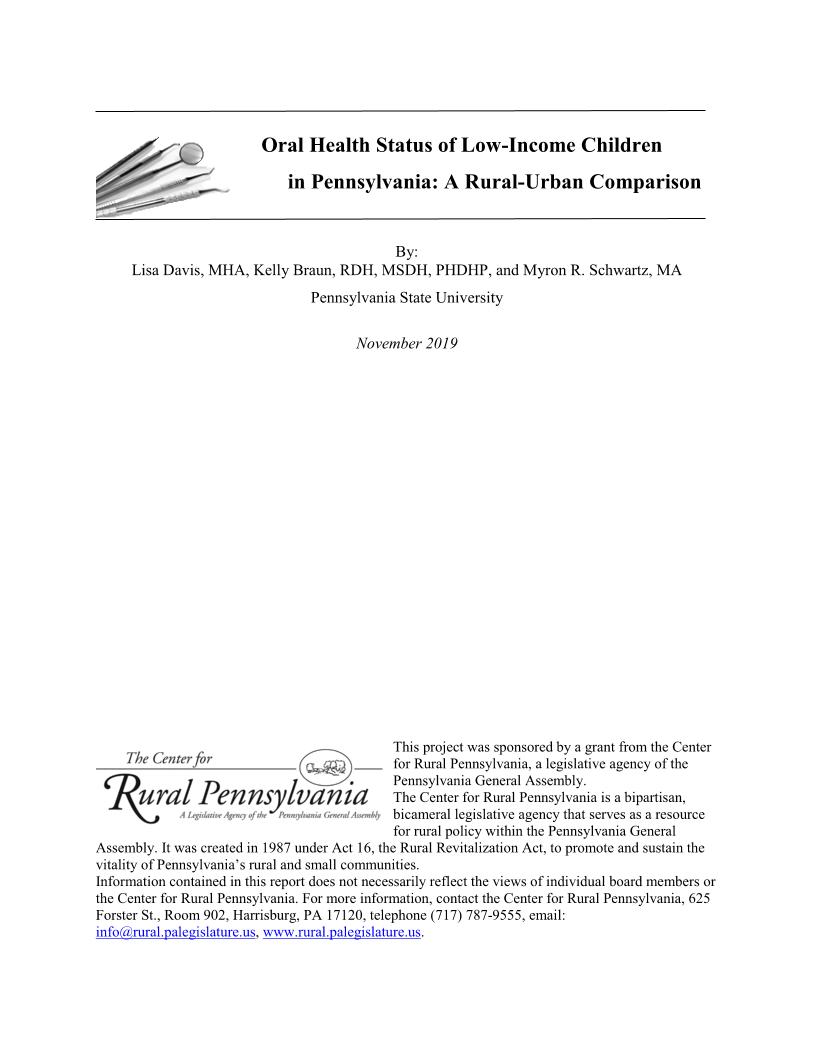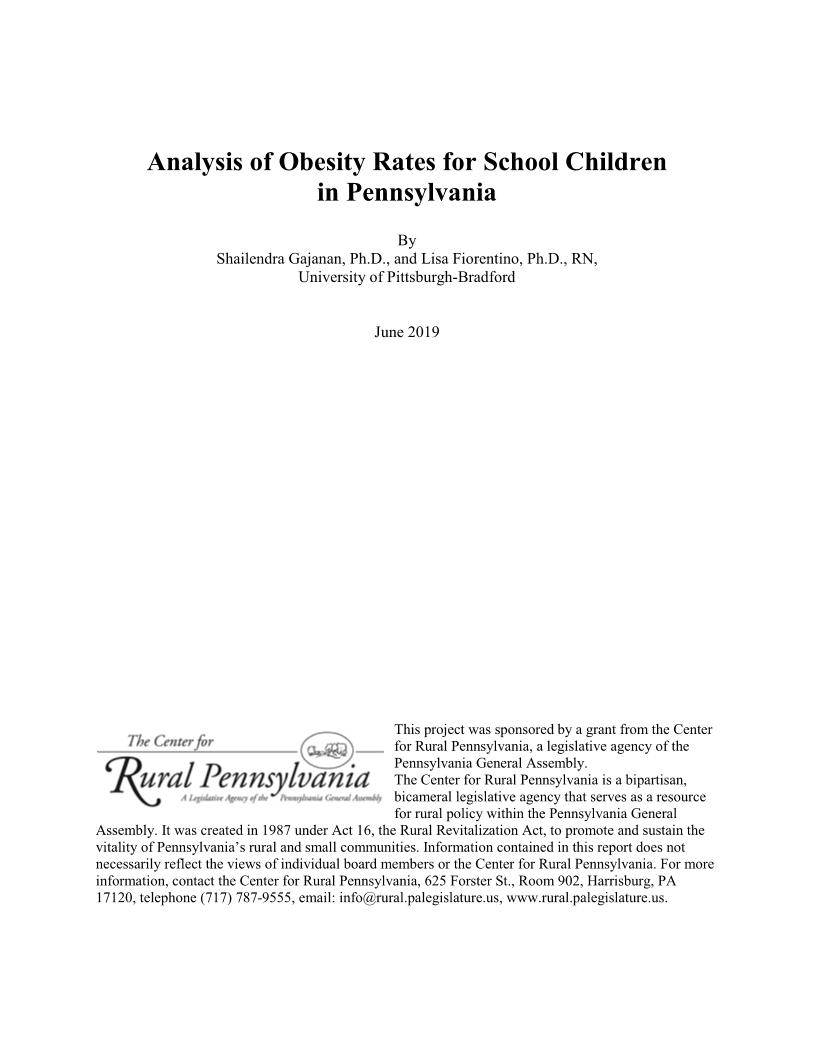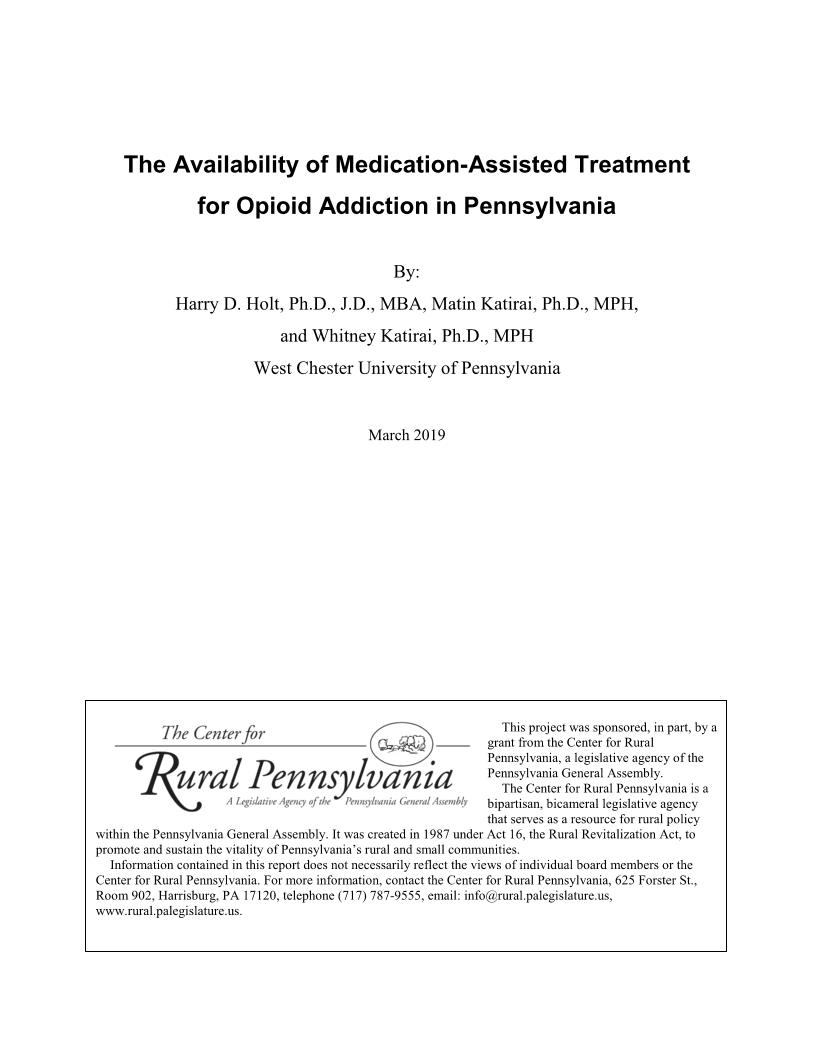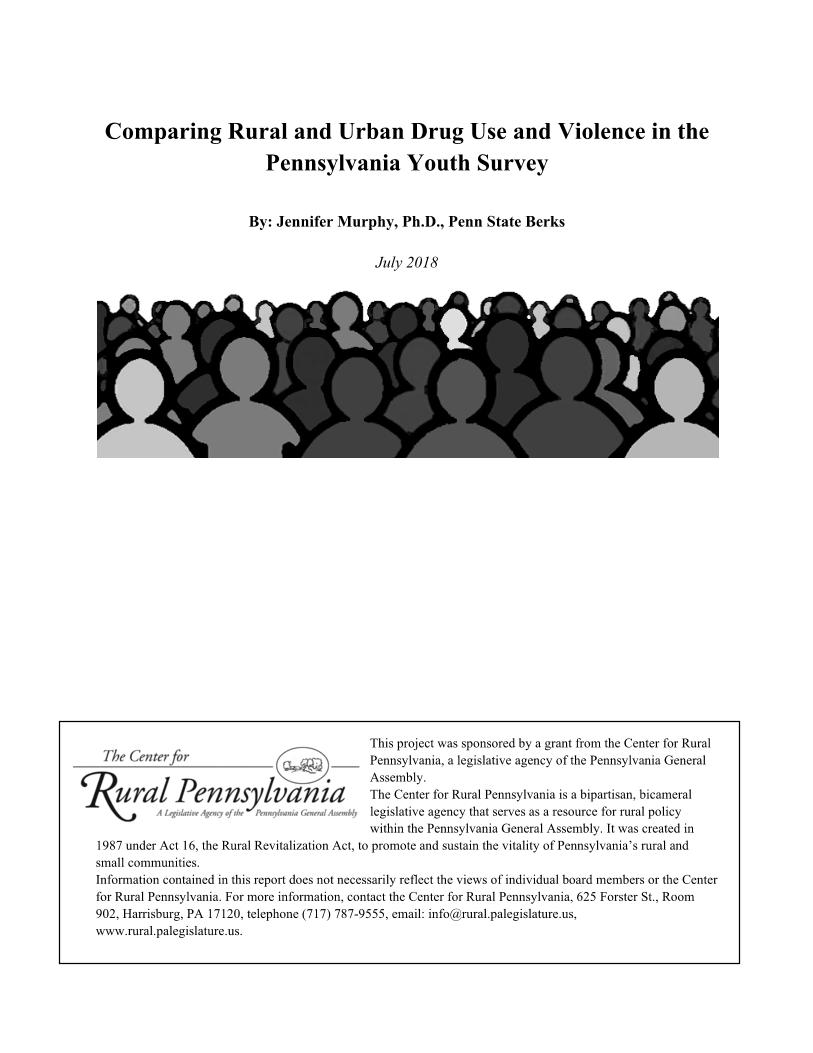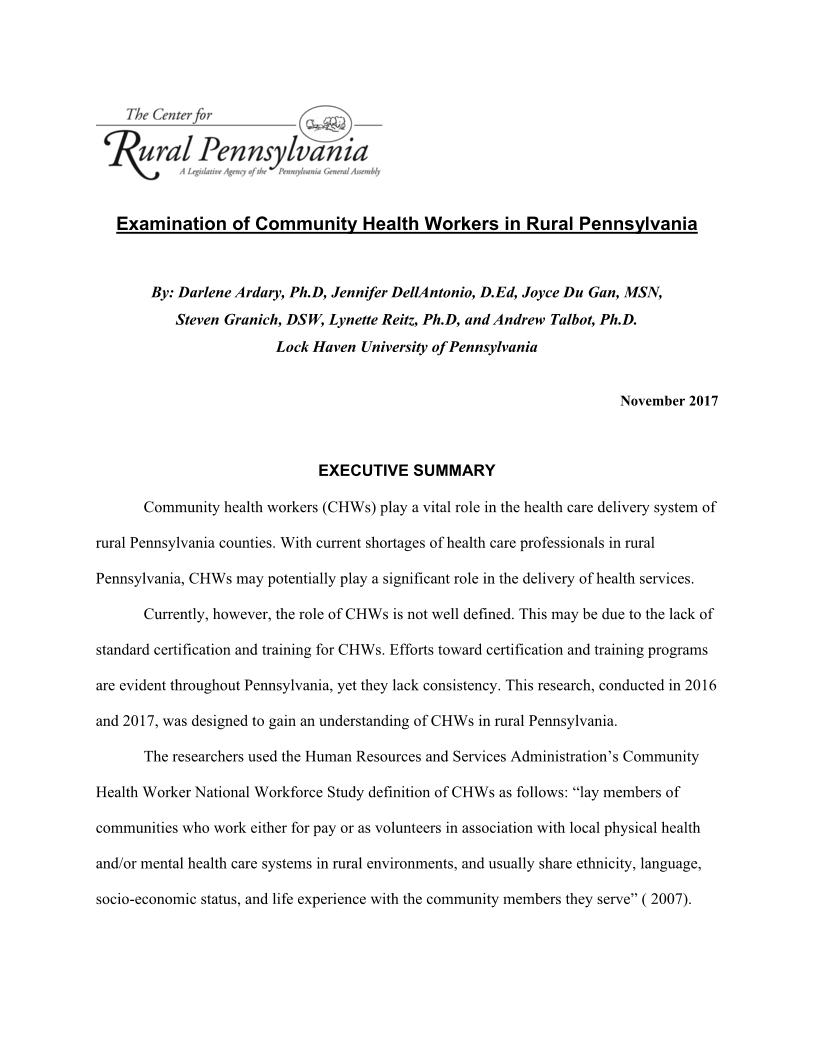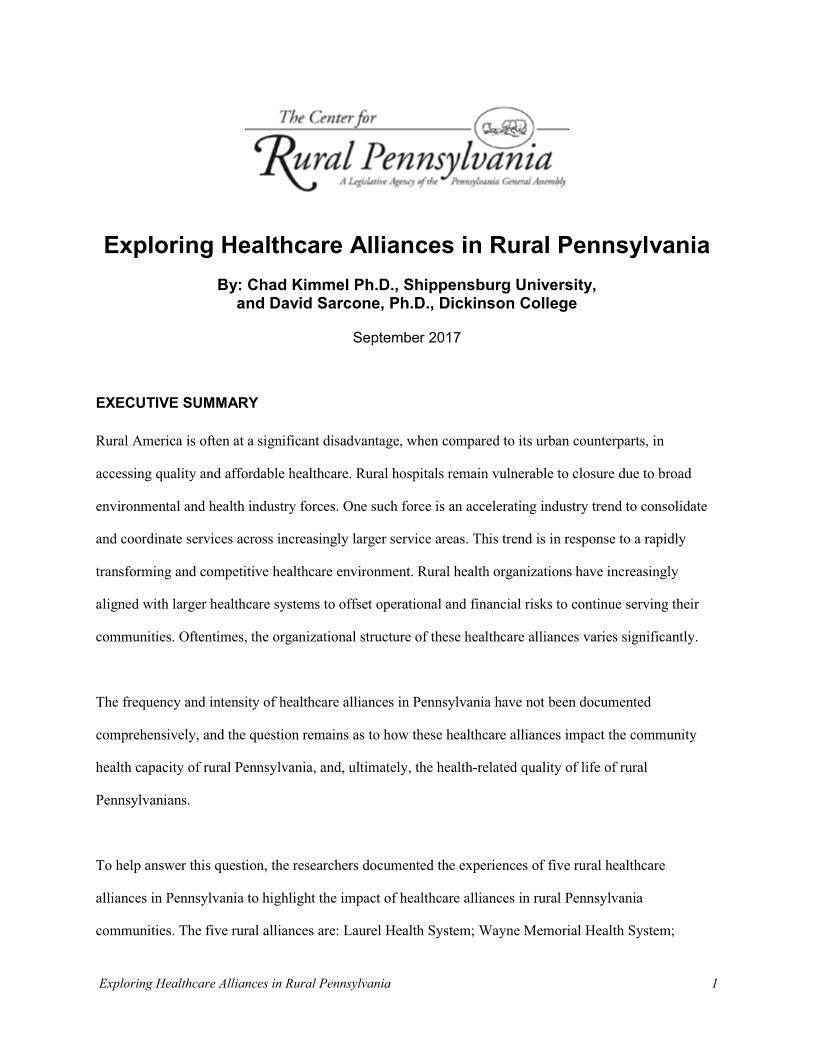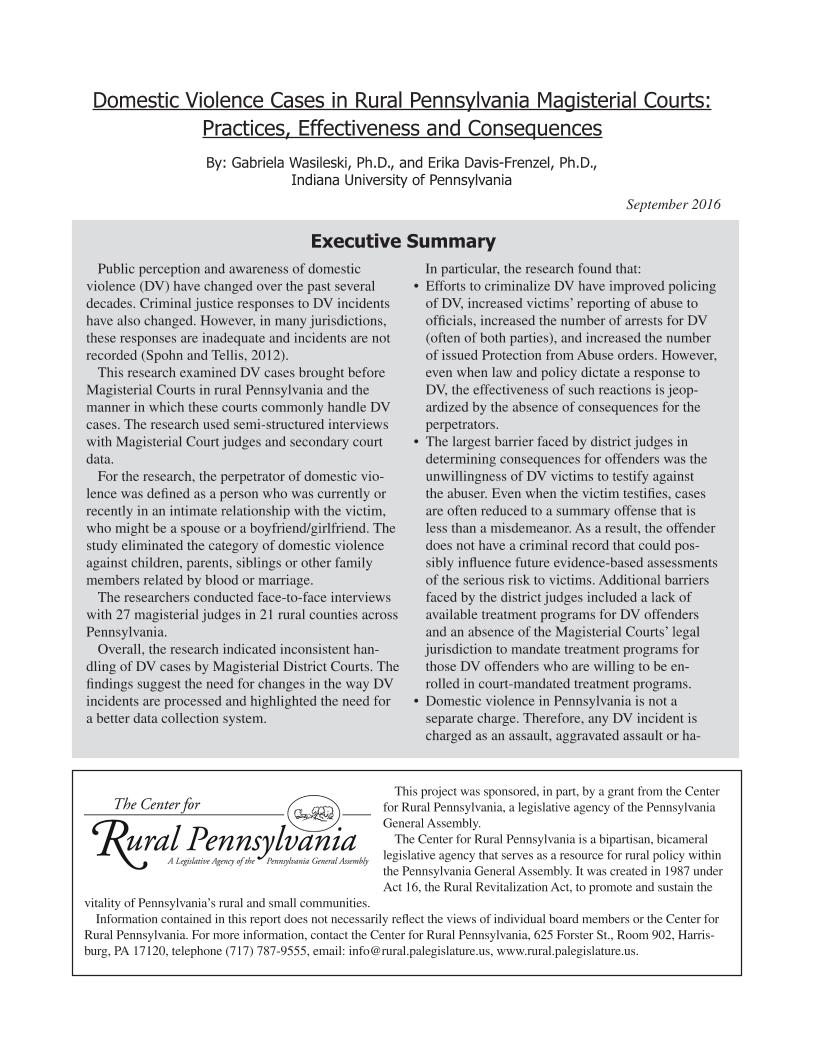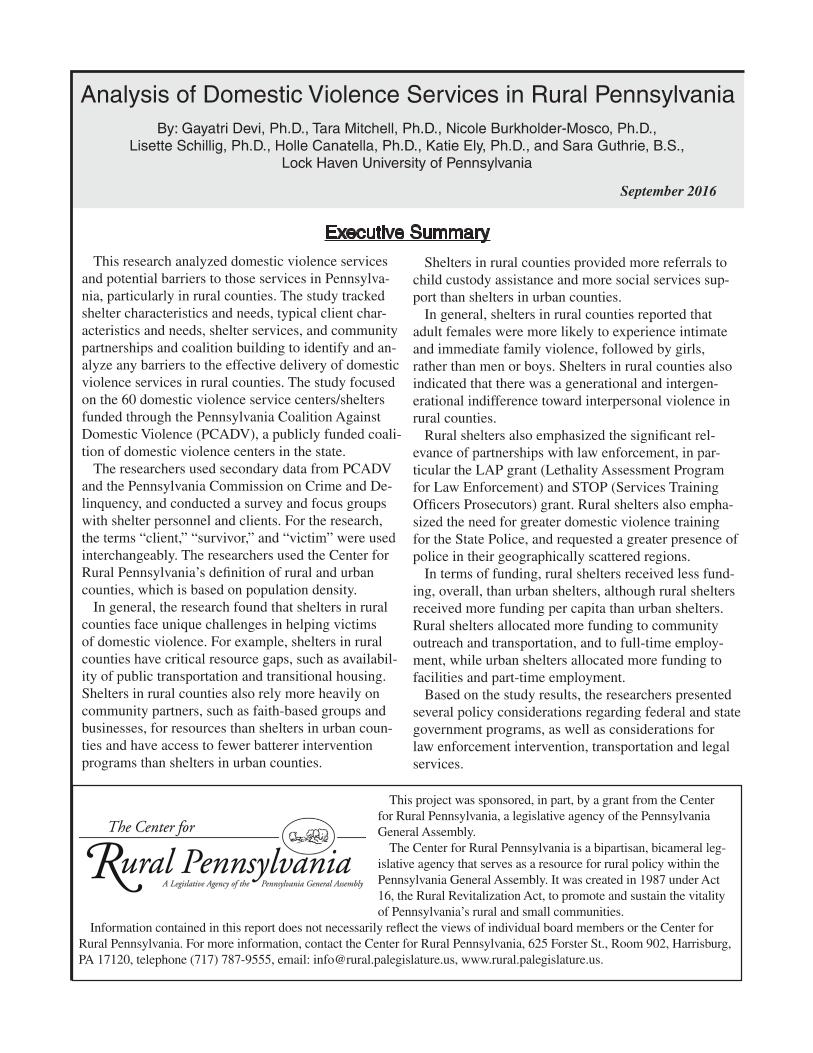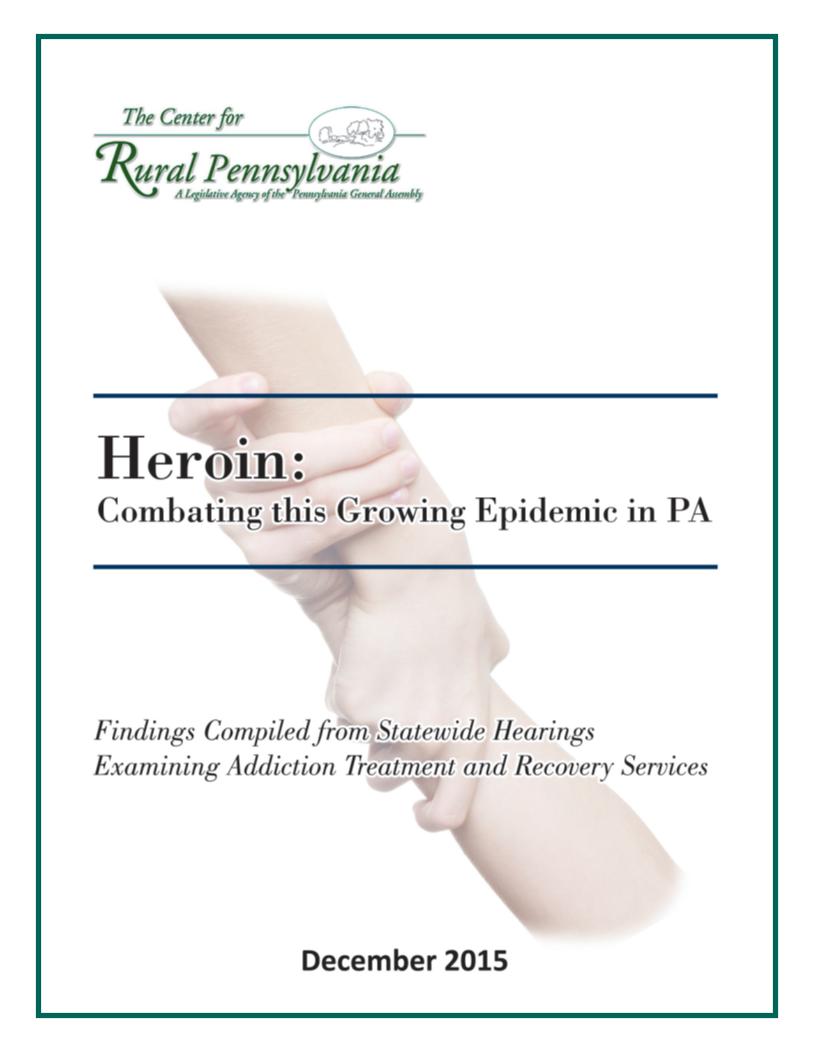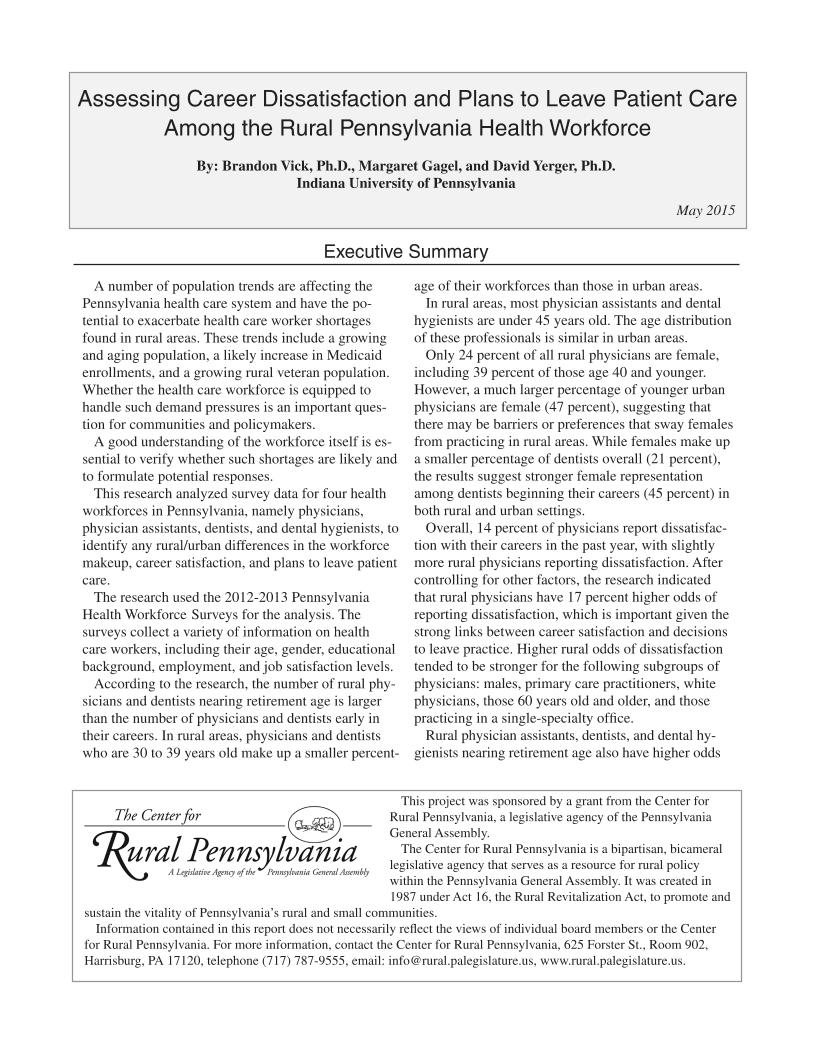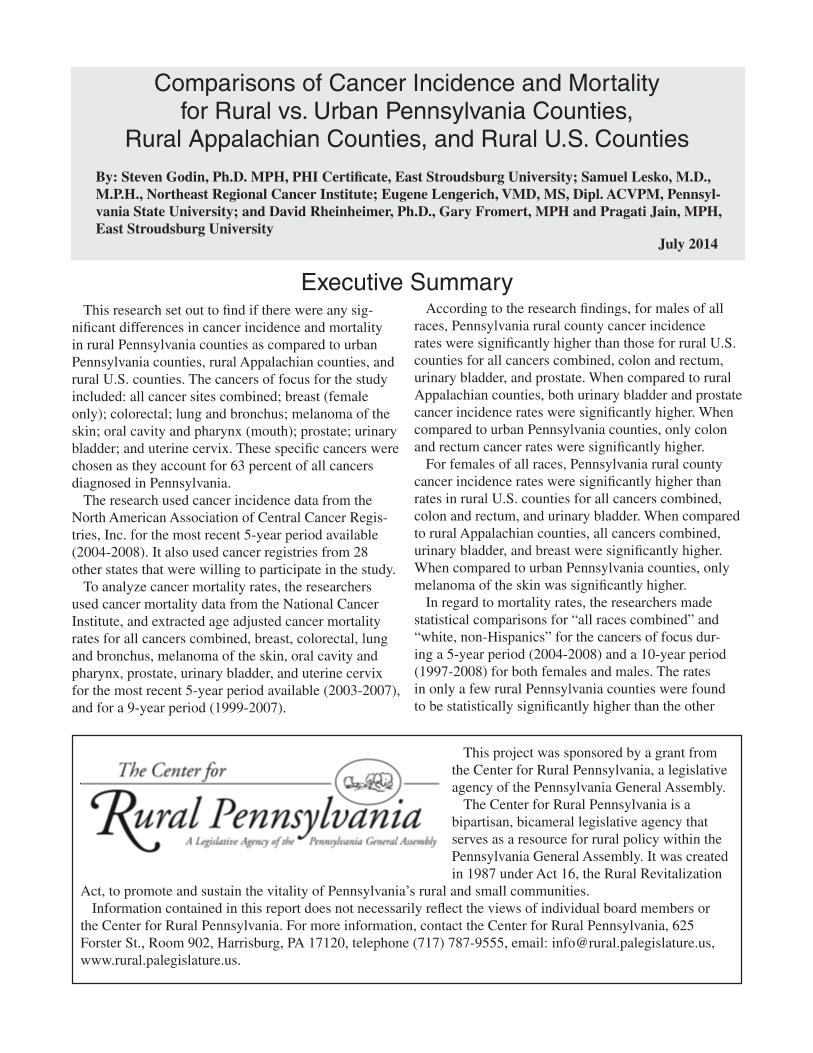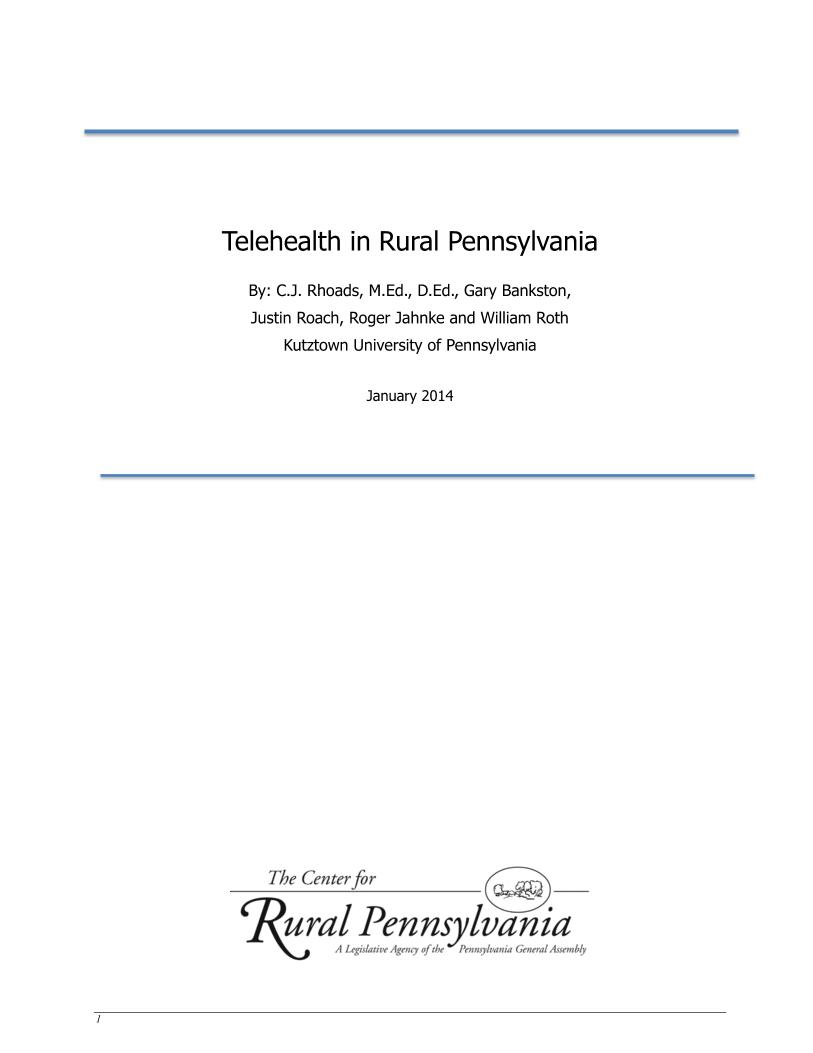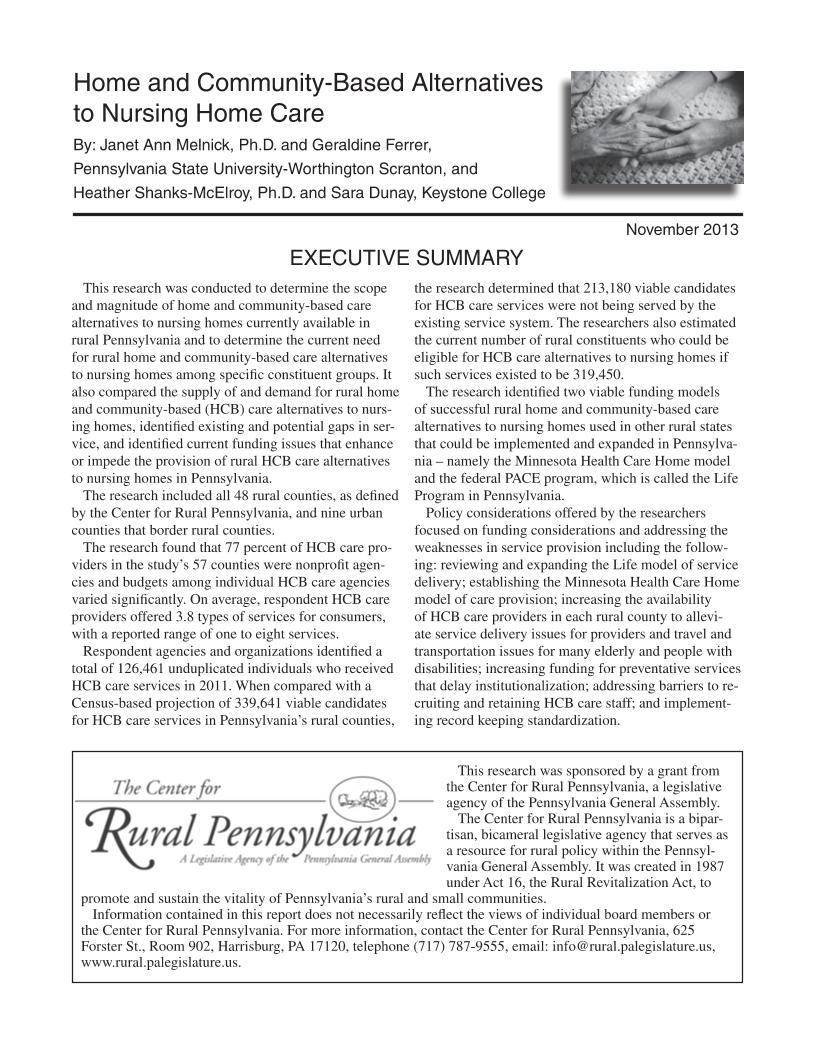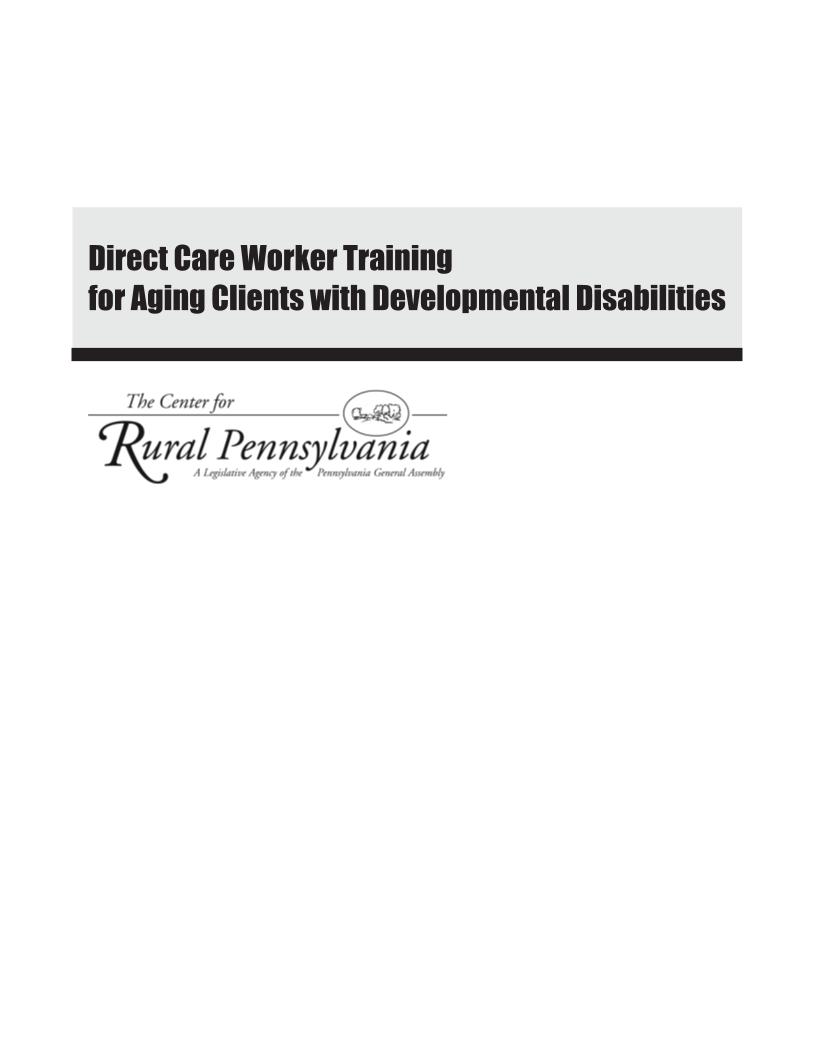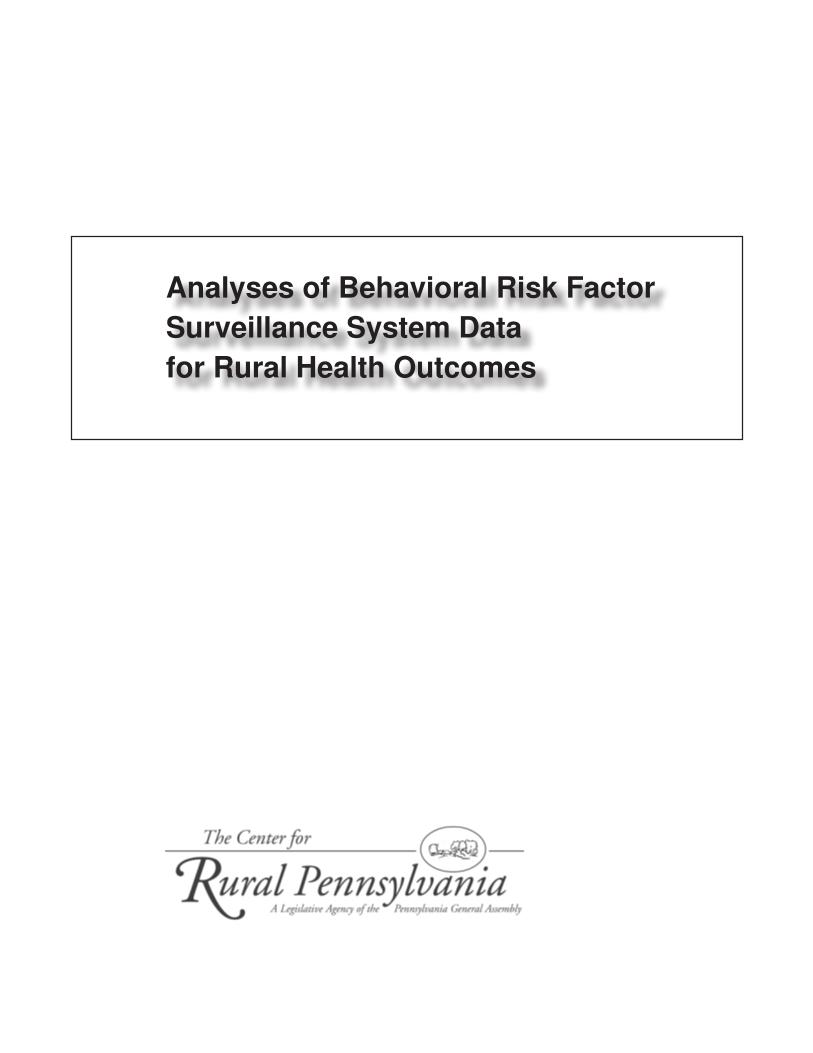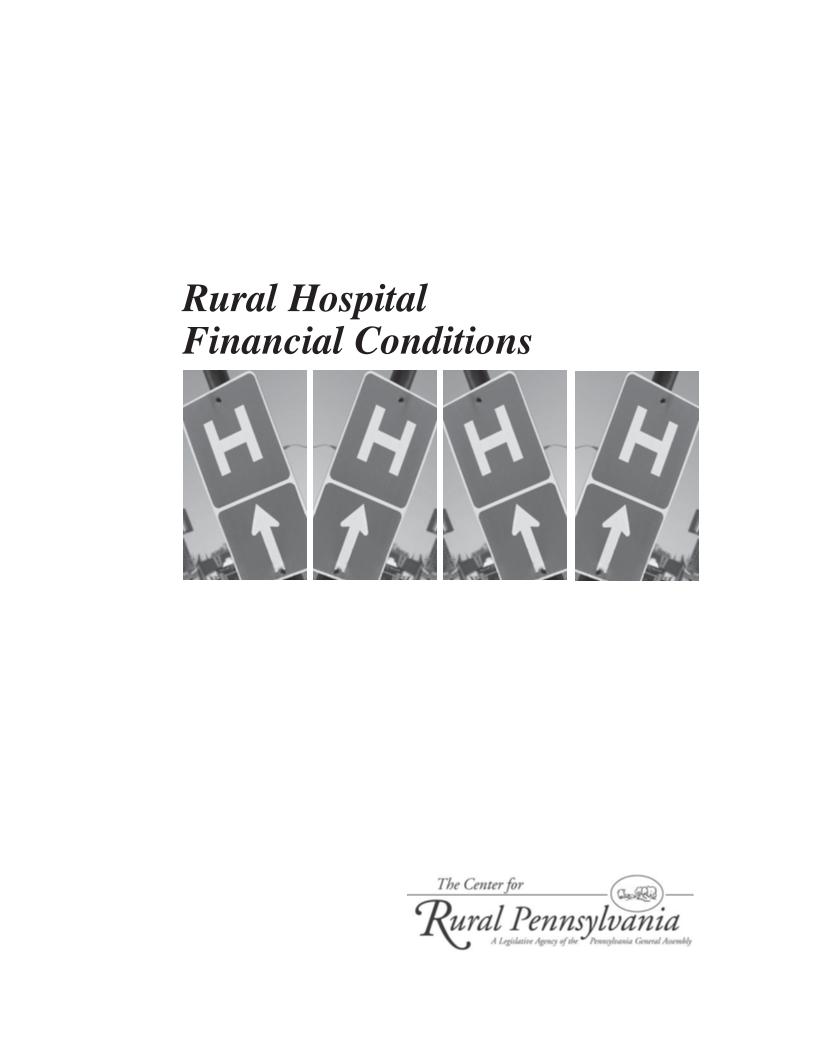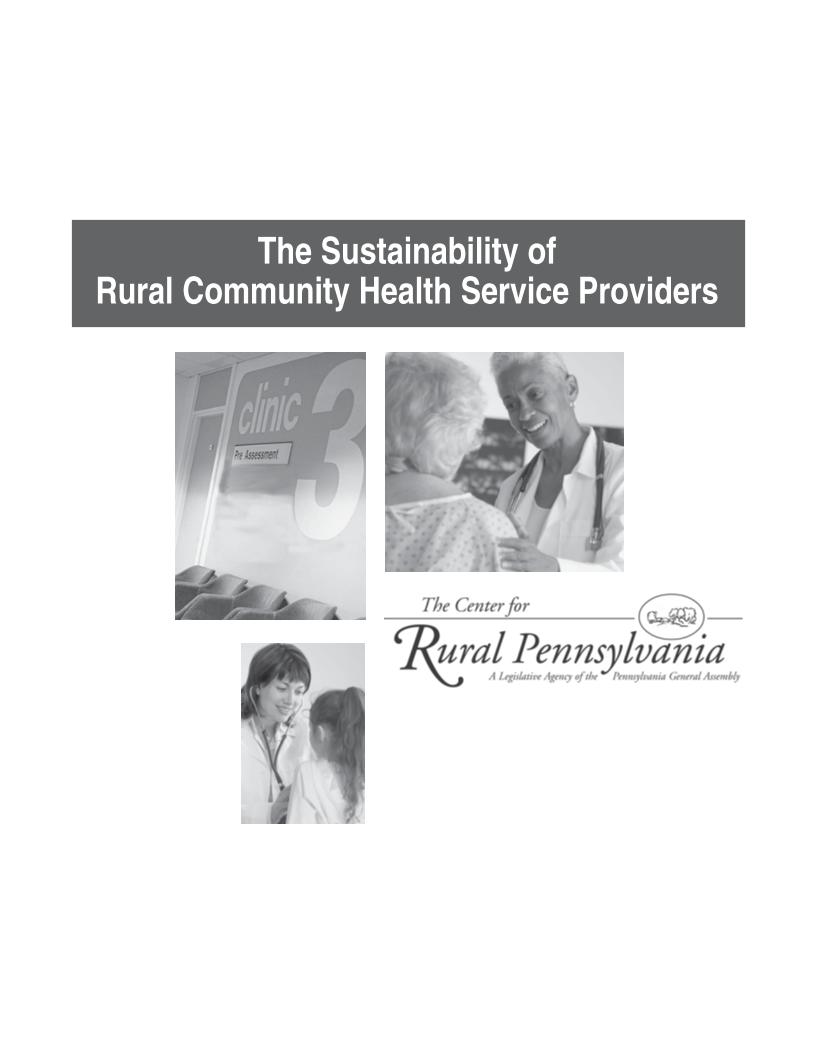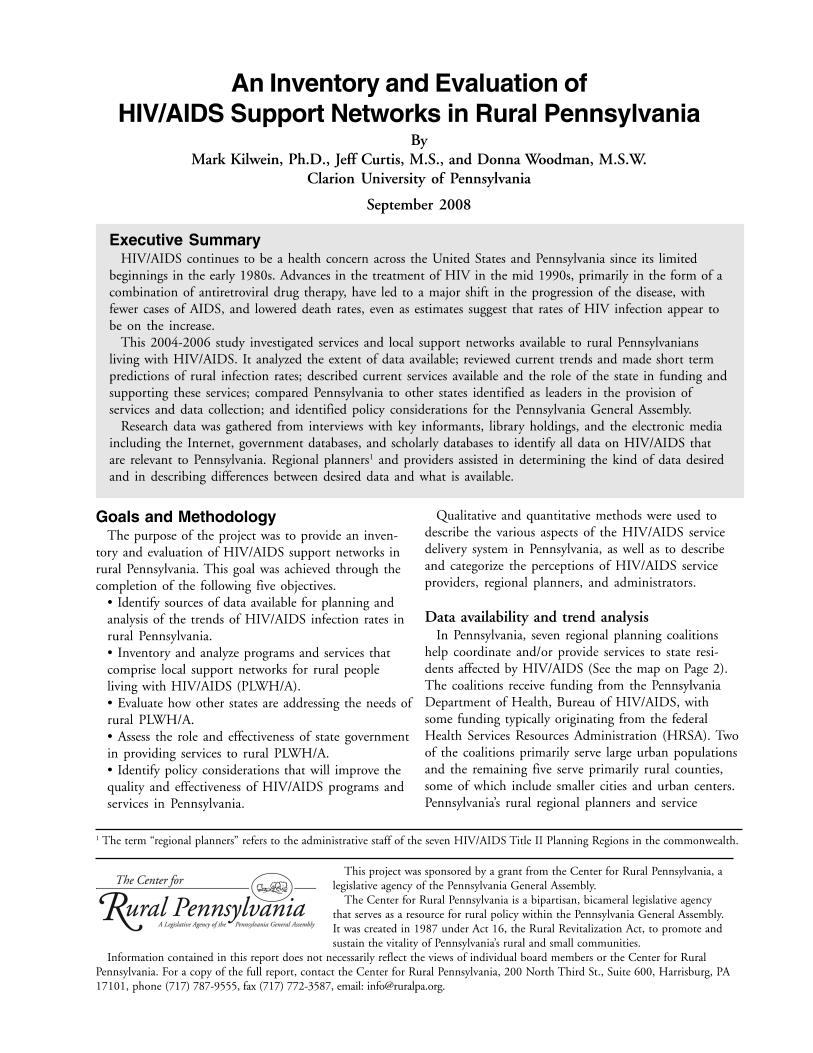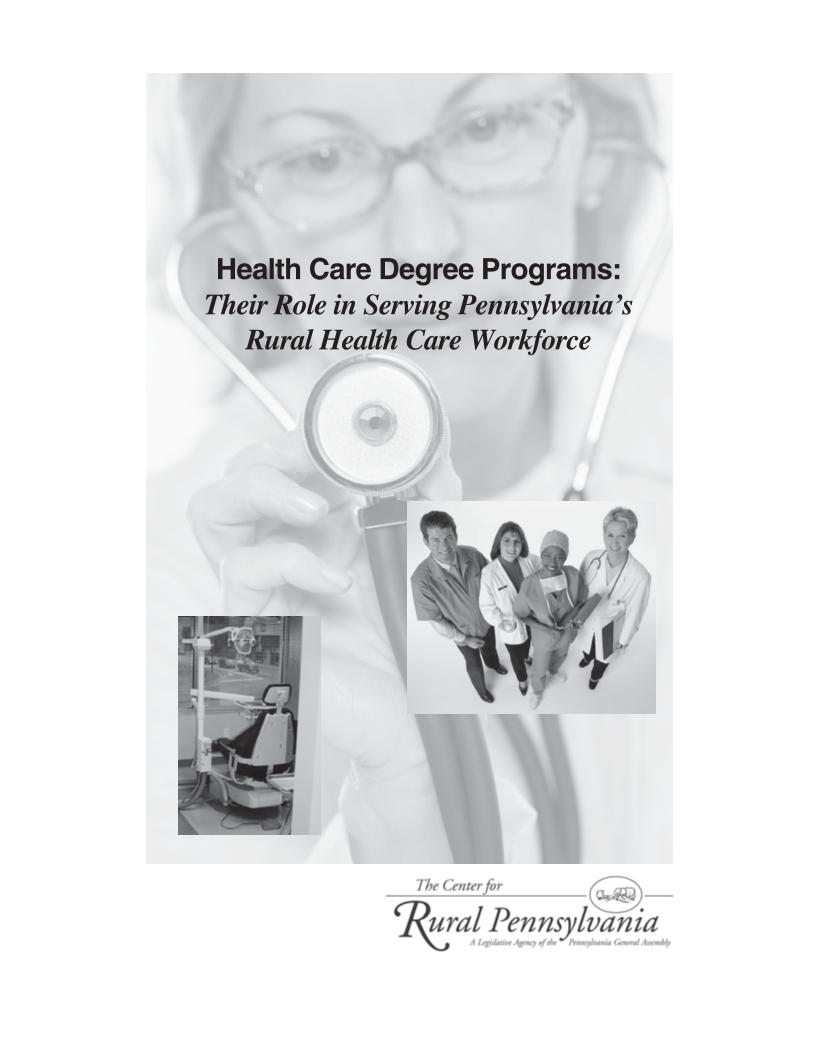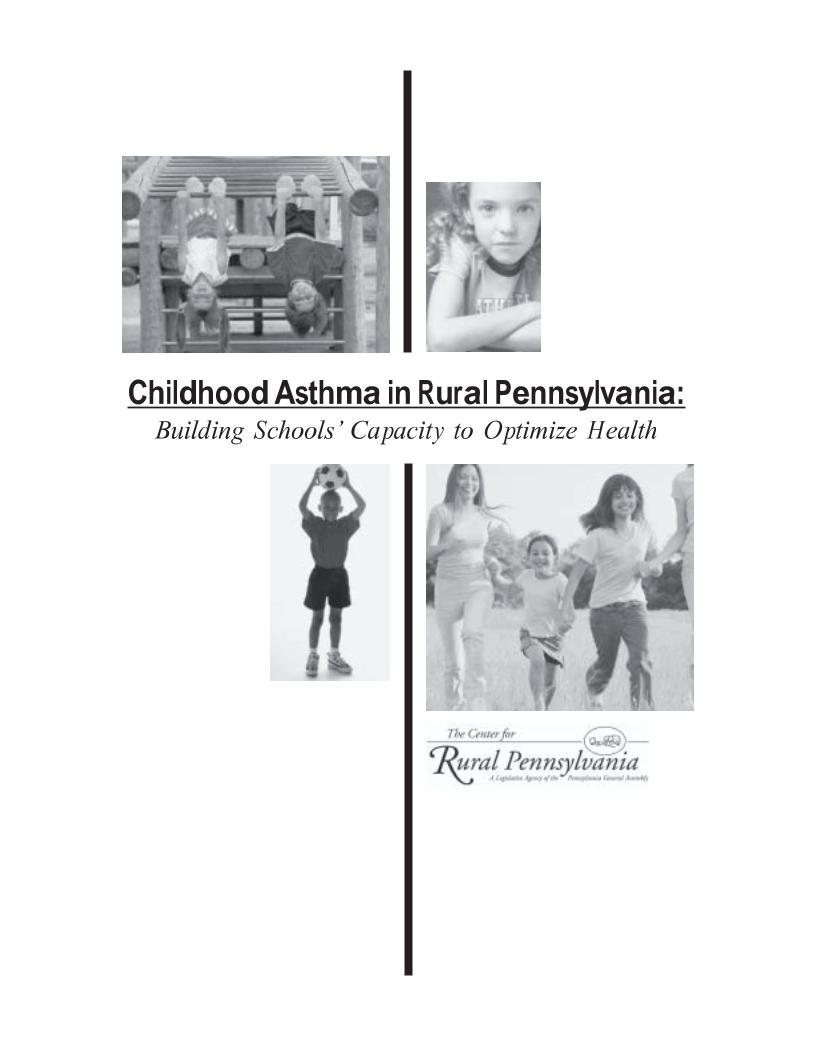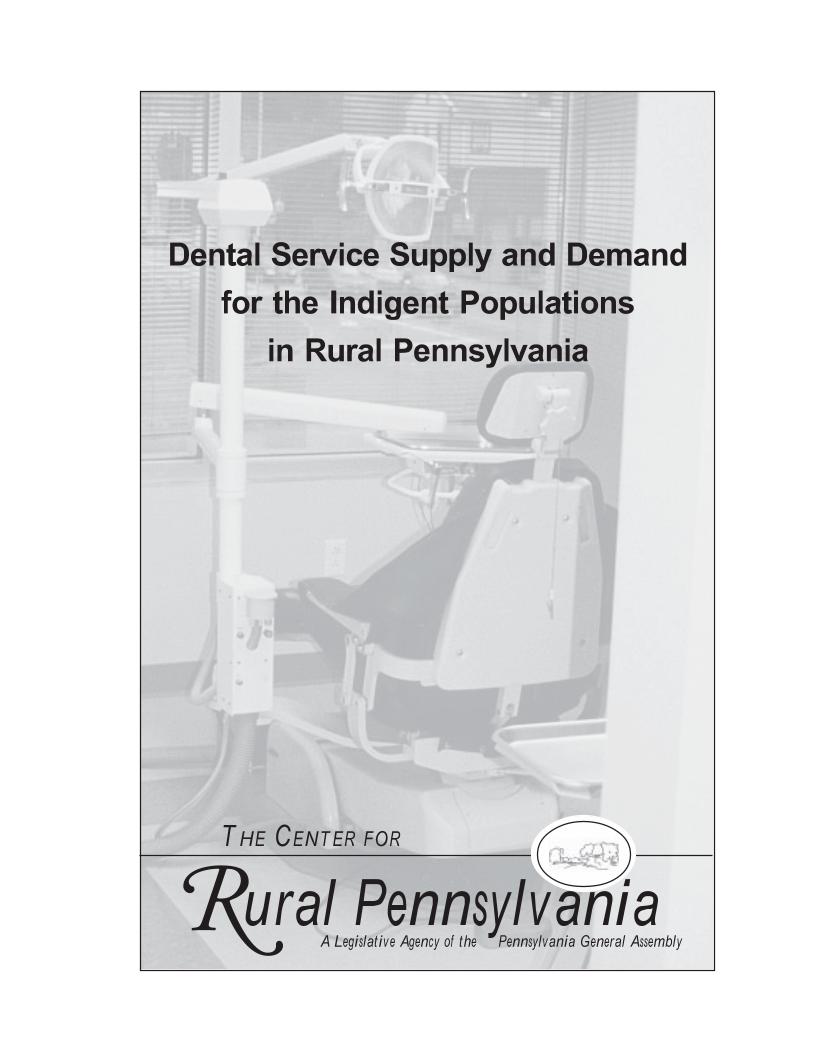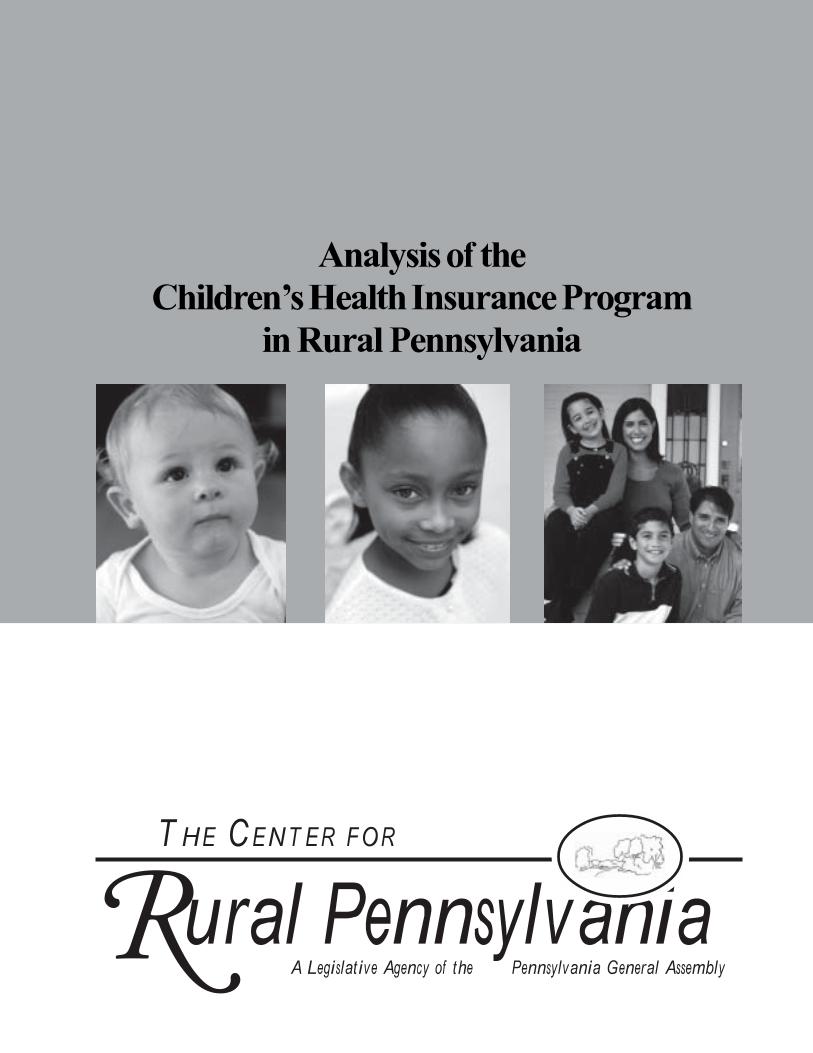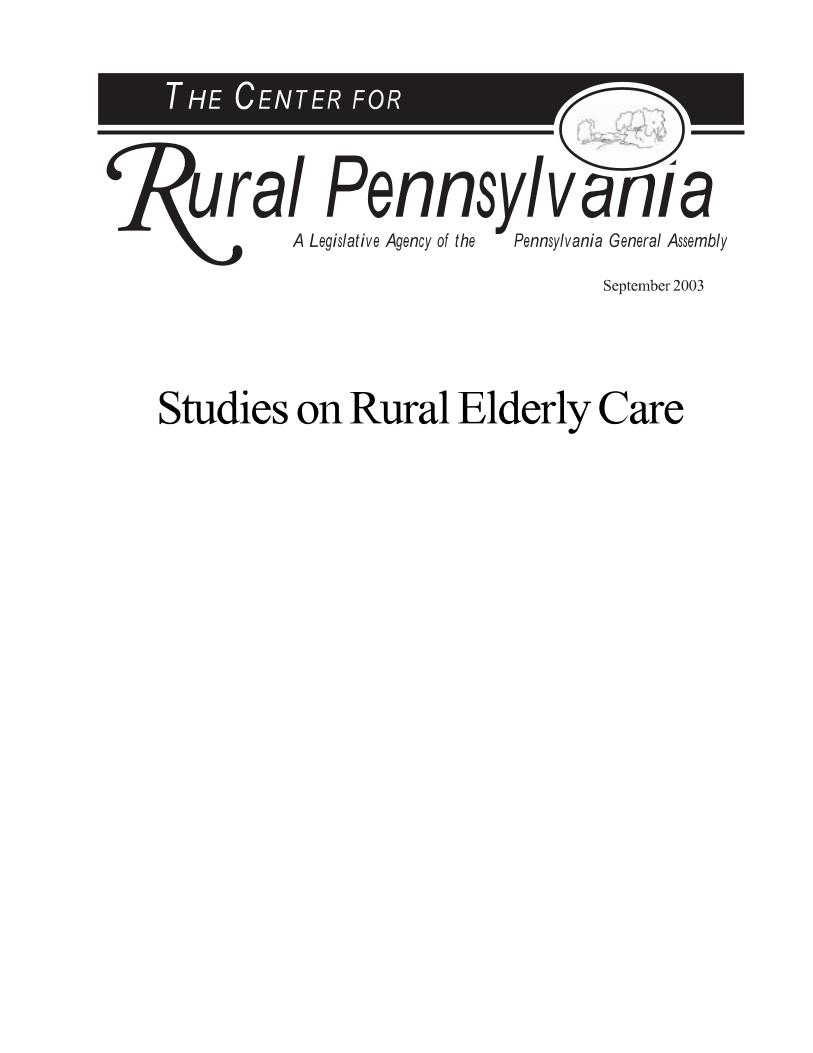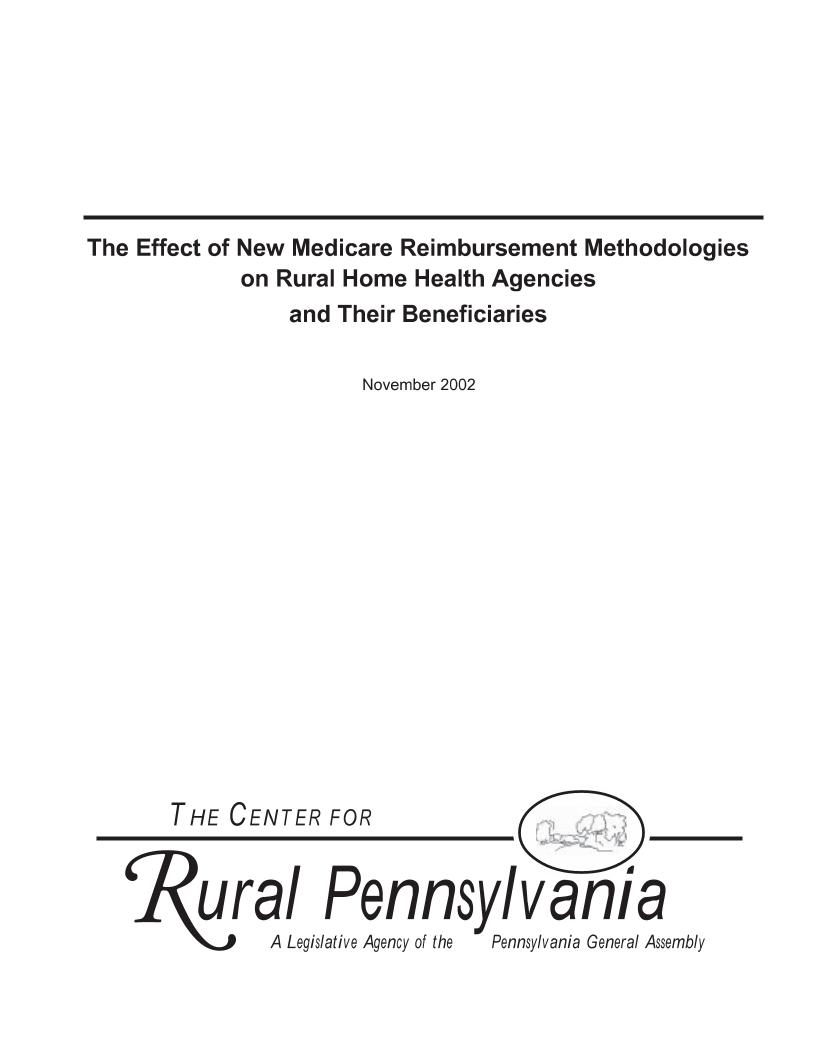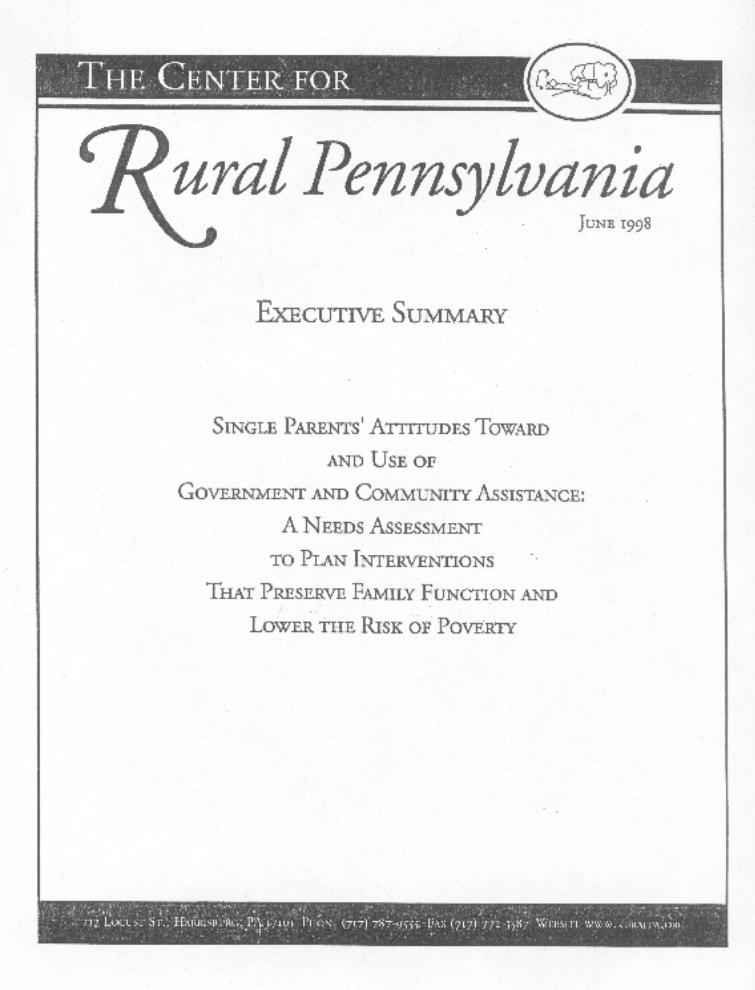Research Reports
2024
An Examination of Emergency Food Supply and Distribution in Rural Pennsylvania
June 25, 2024 | Health Care and Human Services
According to Feeding America, over 10 percent of Pennsylvanians are food insecure, meaning they lack access to adequate and affordable food. The emergency food network aims to reduce food insecurity by helping individuals and households better meet their food needs. This network consists of food banks and their local partner agencies (e.g., food pantries, soup kitchens) that, together, collect and distribute food to people in need. Emergency food organizations are non-governmental, but they rely on support from both the federal and state governments. Two federally funded, state-administered programs—The Emergency Food Assistance Program (TEFAP) and the Senior Food Box Program—and two state-funded and run programs—the State Food Purchase Program (SFPP) and the Pennsylvania Agricultural Surplus System (PASS)—provide significant food and funding to food banks. These collaborations allow both the government and network to provide more comprehensive food assistance than either could provide alone. The emergency food network is complex, and there is a need to consider gaps in the network that can leave both people and places either unserved or underserved. This study examines the strengths and challenges faced by the emergency food network in meeting the food needs of Pennsylvania residents, particularly those in rural areas.
Executive Summary
Tags: emergency food system , food assistance programs , food banks , food pantries , food insecurity
2022
Assessment and Analysis of Housing Quality and Policies in Rural Pennsylvania
September 29, 2022 | Health Care and Human Services
The purpose of this study was to assess housing quality and related policies and programs in rural Pennsylvania. The research goals and objectives focused on four areas: gaining a quantitative understanding of housing quality for rural Pennsylvania communities; understanding barriers faced by rural residents in securing loans to address home improvement; understanding municipal policy and implementation regarding housing maintenance codes; and developing policy considerations that address the key issues regarding housing quality in rural Pennsylvania.
Executive Summary
Tags: housing quality index , sub-quality housing , rural housing , property maintenance codes , housing finance programs
Coroner/Medical Examiner Services in Pennsylvania
August 02, 2022 | Health Care and Human Services
This research provides information about Pennsylvania coroner/medical examiners (C/MEs) and their offices. It examined office caseloads, funding, facilities, forensic capacity, vehicles and equipment, and staffing and training resources. It also assessed how the opioid epidemic and the COVID-19 pandemic affected county C/ME offices.
Executive Summary
Tags: coroner , medical examiner , opiods , covid-19
Access to Maternity and Obstetric Care in Rural Pennsylvania
April 22, 2022 | Health Care and Human Services
This study examined access to maternity care in rural Pennsylvania. Maternity care (also known as obstetric care) can be defined as health care services delivered to women during pregnancy, childbirth, and the postpartum. Access to maternity care is defined as the availability of birthing facilities (hospitals or birth centers) and practitioners (physicians and midwives) providing these health services.
Executive Summary
Tags: maternity care , maternal care , children
Access to Mental Health Services in Rural Pennsylvania
January 24, 2022 | Health Care and Human Services
This research assessed the demand for mental health services in rural Pennsylvania with a focus on youth and the elderly. It identified challenges these populations face in accessing mental health care to provide options for improving and expanding mental health care services for underserved rural Pennsylvanians.
Executive Summary
Tags: mental health , youth , elderly
2021
Recruitment and Retention Issues for Counselors in Rural Pennsylvania Substance Use Disorder Treatment Programs
October 11, 2021 | Health Care and Human Services
Recruiting high-quality counselors is a major problem for rural substance use disorder (SUD) treatment programs. Treatment program directors linked recruitment problems to low salaries, the rural location of the treatment facility, and the lack of adequate training in the SUD field. Emotional exhaustion was the strongest predictor of intent to quit. Low job satisfaction, poor management communication, and a high percentage of clients on medication-assisted treatment were also related to the intent to quit.
Executive Summary
Tags: counseling services , treatment , substance use disorder , mental health
Suicide Trends and Prevention in Rural Pennsylvania Counties and Schools
June 19, 2021 | Health Care and Human Services
This study examined the overall trends in suicide across Pennsylvania from 1990 to 2018, the suicide prevention programs currently used by counties, and the programs that are used in K - 12 school districts. Suicide rates have been increasing over the last decade. In 2018, the suicide rate in rural counties was 25 percent higher than in urban counties. Higher numbers of handgun sales, lower levels of education, lower incomes, larger populations over age 65, and higher unemployment correlate with higher rural suicide rates.
Executive Summary
Tags: mental health , suicide
2020
Availability of Hospice in Rural Pennsylvania (2020)
May 12, 2020 | Health Care and Human Services
Hospice represents a specific form of palliative care that is typically delivered within the last six months of life. There is a strong evidence base that demonstrates the benefits that hospice has on quality of life and cost of care at the patients' end of life. Despite the reported benefits, hospice remains underused, with substantial geographic variation in hospice availability and use rates. Assuming similar patterns of hospice use, the research found that there will be significant increases in future hospice demand, based on projections of an aging population in rural Pennsylvania counties. Interviews with stakeholders - namely hospice care providers in rural Pennsylvania - validated hospice availability and use concerns related to travel time, and lack of choice for patients and families. They also highlighted issues related to using electronic health records in areas with poor internet or cell service.
Executive Summary
Tags: palliative care , aging population , hospice
Evaluation of Senior Community Centers in Rural and Urban Pennsylvania (2020)
March 05, 2020 | Health Care and Human Services
With the growing senior population in Pennsylvania, the research examined challenges and opportunities that senior community centers face. Specifically, the research created an inventory of Pennsylvania's rural and urban senior community center (SCC) locations, including the type of services provided and activities available. Attendance and program participation were analyzed as well as accessibility issues, means of transportation to/from the center, and relevant demographic characteristics. Participants accessed a wide variety of programs, including congregate meals, health, and wellness programs, group recreational programs, and at a few centers, personal care services. The research identified important policy considerations for the Pennsylvania Department of Aging that could help enhance and further support senior community centers across the entire state.
Executive Summary
Tags: senior centers
Child Sexual Abuse and Exploitation in Pennsylvania (2020)
January 08, 2020 | Health Care and Human Services
Research was conducted to understand the characteristics of Commercial Sexual Exploitation of Children (CSEC), and how it is identified and investigated by CYS caseworkers. The research identified challenges in multiple steps of the CYS process, from the initial screening of child abuse reports to the actions of the State Commonwealth Court. Recommendations were made and are intended to improve the quality of the child welfare system in Pennsylvania. The recommendations focus on strategies that can support and enhance child protection work statewide. Pennsylvania's statutory requirement for expungement of CYS cases dispositioned as "unfounded", "invalid," or "screened-out" without an investigation, can create numerous barriers to CYS's ability to keep children safe. The researchers identified high variability in the rate at which reports were screened out across counties, potentially resulting in disparate access to protective services depending on one's address.
Executive Summary
Tags: child sexual abuse , child exploitation
2019
Oral Health Status of Low-Income Children in Pennsylvania: A Rural-Urban Comparison (2019)
November 20, 2019 | Health Care and Human Services
The overall goal of the research study was to develop recommendations for public policy to improve the oral health status of low-income children residing in rural Pennsylvania. Specifically, the research, conducted in 2018-2019, analyzed: (1) the oral health component of the Medical Assistance (MA) program for children in Pennsylvania, (2) the Children's Health Insurance Program (CHIP), (3) a variety of additional oral health programs and services, (4) the school oral health program, (5) the supply and geographic distribution of dentists in Pennsylvania, and (6) the overall oral health care delivery system for low-income children in rural Pennslyvania.
Executive Summary
Tags: low-income , children , oral health
Analysis of Obesity Rates for School Children n Pennsylvania (2019)
June 19, 2019 | Health Care and Human Services
The U.S. Department of Health considers about one-third of children and adolescents aged 6 to 19 to be overweight or obese. In particular, the Pennsylvania Department of Health defines childhood obesity for persons aged 2-19 years as a Body Mass Index (BMI) at or above the 95th percentile. The BMI-for-age is a useful measure because it allows one to compare obesity rates of similar cohorts across different states, or across different counties in a particular state. Previous research conducted by the Center for Rural Pennsylvania (2005) indicated that rural areas have higher obesity rates. From an economic standpoint, there are private and social costs associated with obesity. Crucial private costs of obesity are lower productivity, income inequality, and higher healthcare costs. Research in nutrition economics and health economics found that childhood obesity has a negative impact on academic performance and leads to lower self-esteem, and exposes students to bullying and hidden bias among peers and teachers.
Executive Summary
Tags: children , obesity
The Availability of Medication-Assisted Treatment for Opioid Addiction in Pennsylvania (2019)
March 06, 2019 | Health Care and Human Services
This study assessed the barriers and opportunities that exist in expanding Medication-Assisted Treatment (MAT) services in Pennsylvania. MAT includes the use of methadone, buprenorphine, Suboxone, naloxone, and naltrexone in residential, behavioral, or outpatient programs, hospitals, and jails and prisons to help individuals suffering from opioid addiction to overcome withdrawal symptoms, cravings, and potential overdose. The research found that those who seek emergency care and long-term treatment for opioids and who live in rural areas of Pennsylvania have limited access to care. Other barriers to accessing MAT services are lack of childcare and housing, lack of transportation, limited private insurance coverage, and limited funding for MAT services. Combating heroin and opioid use disorders requires an "all-in" commitment. It should continue to enforce laws and regulations enacted to provide coverage for mental health services for patients suffering from addiction and direct additional state and federal funding to support MAT services throughout Pennsylvania.
Executive Summary
Tags: opioid , addiction
2018
Comparing Rural and Urban Drug Use and Violence in the Pennsylvania Youth Survey (2018)
July 16, 2018 | Health Care and Human Services
Understanding youth drug use and violent behavior is an important step in reducing drug use and violence in Pennsylvania. Rural and urban areas may have different rates of drug use and violence and thus require different types of interventions. In terms of alcohol and illicit drug use, the results indicated little overall differences between urban and rural students. However, the analysis only examined the number of prevention programs in a school district and the data did not include details about individual programs operating in schools. Further research could attempt to get more school-specific details about the programs that operated in those schools.
Executive Summary
Tags: addiction , violence , youth
2017
Examination of Community Health Workers in Rural Pennsylvania (2017)
November 16, 2017 | Health Care and Human Services
Community health workers (CHWs) play a vital role in the health care delivery system of rural Pennsylvania counties. Currently, the role of CHWs is not well defined. Efforts toward certification and training programs are evident throughout Pennsylvania, yet they lack consistency. The research gathered information on CHWs through surveys, focus groups, and interviews. Results found that CHWs are used in a variety of agencies and contexts in rural Pennsylvania, with duties ranging from working with the elderly to working with infants and children. It was evident from the research that low pay, high turnover, and lack of adequate funding were significant issues for many agencies. In addition, many agencies experienced large caseloads and lacked consistent CHWs certification and training. A variety of educational backgrounds and training further complicates the consistency of CHW roles. The researchers found that decisions on certification and training need to be made by the state legislature and the state Departments of Health and Human Services.
Executive Summary
Tags: health care , home health care , community health workers , health workers
Exploring Healthcare Alliances in Rural Pennsylvania (2017)
September 10, 2017 | Health Care and Human Services
Rural America is often at a significant disadvantage in accessing quality and affordable healthcare. Rural hospitals remain vulnerable to closure due to broad environmental and health industry forces. Rural health organizations have increasingly aligned with larger healthcare systems to offset operational and financial risks. The question remains as to how these healthcare alliances impact the community health capacity of rural Pennsylvania. Rural community health leaders believed that the benefits of forming alliances better leverage scarce resources and outweighed the associated costs. Overall the outcomes of affiliations are positive. In most cases, these alliances minimized the rural hospitals' operational and financial risks and increased investment in rural hospitals and their associated services.
Tags: healthcare
2016
Domestic Violence Cases in Rural Pennsylvania Magisterial Courts: Practices, Effectiveness, and Consequences (2016)
September 19, 2016 | Health Care and Human Services
This research examined domestic violence (DV) cases brought before Magisterial Courts in rural Pennsylvania and the manner in which these courts commonly handle DV cases. The research used semi-structured interviews with Magisterial Court judges and secondary court data.
Tags: pennsylvania courts , magisterial courts , intimate partner violence , domestic violence , justice
Analysis of Domestic Violence Services in Rural Pennsylvania (2016)
September 17, 2016 | Health Care and Human Services
This research analyzed domestic violence services and potential barriers to those services in Pennsylvania, particularly in rural counties. The study tracked shelter characteristics and needs, typical client characteristics and needs, shelter services, community partnerships, and coalition building to identify and analyze any barriers to the effective delivery of domestic violence services in rural counties. In general, the research found that shelters in rural counties face unique challenges in helping victims of domestic violence such as critical resource gaps, availability of public transportation, and transitional housing. Rural shelters rely heavily on their community partners, such as faith groups and local business, for resources such as hotel stay, medical stays, and other day-to day needs.
Tags: domestic violence , services
2015
Heroin: Combating this Growing Epidemic in PA - Findings Compiled from Statewide Hearings on Addiction Treatment and Recovery Services (2015)
December 17, 2015 | Health Care and Human Services
This report summarizes the testimony presented at the Center for Rural Pennsylvania's second round of statewide public hearings in July and August 2015. The hearings took a closer look at heroin and opioid addiction, specifically treatment and recovery services in Pennsylvania. These hearings were held July 21 at Saint Vincent College in Latrobe, July 29 at The Commonwealth Medical College in Scranton, and August 18 at the Yorktowne Hotel in York.
Tags: treatment and recovery , addiction , opioids , heroin , crisis
Assessing Career Dissatisfaction and Plans to Leave Patient Care Among the Rural Pennsylvania Health Workforce (2015)
May 11, 2015 | Health Care and Human Services
This research analyzed survey data for four health workforces in Pennsylvania, namely physicians, physician assistants, dentists, and dental hygienists, to identify any rural/urban differences in the workforce makeup, career satisfaction, and plans to leave patient care. The research used the 2012-2013 Pennsylvania Health Workforce Surveys for the analysis. The surveys collect a variety of information on health care workers, including their age, gender, educational background, employment, and job satisfaction levels.
Tags: patient care , health care work , career satisfaction , health workers
2014
Comparison of Cancer Incidence and Mortality for Rural vs. Urban Counties, Rural Appalachian Counties and Rural U.S. Counties (2014)
July 13, 2014 | Health Care and Human Services
This research set out to find if there were any significant differences in cancer incidence and mortality in rural Pennsylvania counties as compared to urban Pennsylvania counties, rural Appalachian counties, and rural U.S. counties.
Tags: rural cancer incidence , appalachia
Telehealth in Rural Pennsylvania (2014)
January 14, 2014 | Health Care and Human Services
Telehealth, which is the use of electronic information and telecommunications technologies to support long-distance clinical health care, patient and professional health-related education, and public health and health administration, has been proposed as a possible solution to meeting these challenges. This research, conducted in 2012 and 2013, set out to describe how and to what extend telehealth is being implemented in rural Pennsylvania.
Tags: telehealth , rural health care , public health
2013
Home and Community-Based Alternatives to Nursing Home Care (2013)
November 17, 2013 | Health Care and Human Services
This research determined the scope and magnitude of home and community-based care alternatives to nursing homes currently available in rural Pennsylvania and the current need for rural home and community-based care alternatives to nursing homes among specific constituent groups.
Tags: rural health care , home health care , community health care , nursing care
2010
Direct Care Worker Training for Aging Clients with Developmental Disabilities (2010)
July 19, 2010 | Health Care and Human Services
This study examined how Pennsylvania direct care workers (DCWs) in the aging and mental retardation/developmental disabilities (MR/DD) provider systems are trained to meet the needs of the growing population of individuals with developmental disabilities who are aging, and how training needs and challenges may be different in rural areas. To conduct the study, the researchers compared Pennsylvania regulations for DCW training with publicly available DCW training regulations of other states and with evidence-based best practices. They also surveyed licensed Pennsylvania aging and MR/DD service providers to gather data on current training practices, challenges and needs, and to identify issues specific to rural service providers. Finally, the researchers conducted a content analysis of currently used materials for DCW training that were provided or reported by service provider organizations to compare current practices in Pennsylvania’s rural and non-rural areas with best practices.
Tags: developmental disabilities , aging adults , direct care workforce
Analyses of Behavioral Risk Factor Surveillance System Data for Rural Health Outcomes (2010)
May 30, 2010 | Health Care and Human Services
The two research projects highlighted in this report used the BRFSS data to: take a closer look at the health conditions and risk factors of and the use of preventive services by Pennsylvania’s rural population; and determine if geographic targeting of public health programming was a viable option in rural Pennsylvania.
The first research project was conducted by researchers from Slippery Rock University of Pennsylvania.The research goal was to compare common health conditions, risk factors for chronic diseases, and the use of preventive health care services between rural and urban Pennsylvania residents to provide more information about the health of rural Pennsylvania residents and to inform health policies.
The second project was conducted by researchers from Pennsylvania State University. The goal of this research was to analyze patterns in health status, healthy behaviors, and health care access and use in rural Pennsylvania to determine the validity of geographic targeting of public health programming in rural Pennsylvania.
Tags: public health , brfss , health conditions , preventive health care services , health policies , chronic disease
Rural Hospital Financial Conditions (2010)
March 17, 2010 | Health Care and Human Services
The Center for Rural Pennsylvania sponsored two research projects related to rural hospital finances in 2008. The first research project was conducted by researchers from Pennsylvania State University-Harrisburg and Shippensburg University of Pennsylvania. The goal of the research was to develop a comprehensive model for evaluating financial distress in general acute care hospitals in rural Pennsylvania. The second project, conducted by researchers from Pennsylvania State University, examined the financial performance of rural hospitals from a number of perspectives, including profitability, liquidity, efficiency and capital structure.
Tags: hospital finances , financial distress model , general acute care hospitals , critical access hospitals
The Sustainability of Rural Community Health Service Providers (2010)
January 17, 2010 | Health Care and Human Services
The general goal of this research was to describe the role that health centers play within the health care delivery system in the commonwealth and to consider the factors that may affect the sustainability of that role. To conduct the study, the researchers surveyed key informants from Certified Medicare Rural Health Clinics and Federally Qualified Health Centers in Pennsylvania. They also used secondary data to complement the survey findings.
Tags: health care delivery , fqhc , clinics , rural health centers
2008
An Inventory and Evaluation of HIV/AIDS Support Networks in Rural Pennsylvania
January 01, 2008 | Health Care and Human Services
This 2004-2006 study investigated services and local support networks available to rural Pennsylvanians living with HIV/AIDS. It analyzed the extent of data available; reviewed current trends and made short-term predictions of rural infection rates; described current services available and the role of the state in funding and supporting these services; compared Pennsylvania to other states identified as leaders in the provision of services and data collection; and identified policy considerations for the Pennsylvania General Assembly
Tags: hiv , aids , support services , infection rates
Health Care Degree Programs: Their Role in Serving Pennsylvania's Rural Health Care Workforce
January 01, 2008 | Health Care and Human Services
This research explored how Pennsylvania’s health care degree programs serve the commonwealth’s health care workforce, especially in rural areas. It involved an inventory of Pennsylvania’s health care degree programs, a description of their geographic distribution, and an assessment of educational capacity by discipline. The research, conducted in 2006, paid particular attention to physicians, dentists, and nurses.
Tags: health care professionals , health care degree programs , physicians , dentists , nurses
2006
Childhood Asthma in Rural Pennsylvania: Building Schools Capacity to Optimize Health
January 01, 2006 | Health Care and Human Services
Tags: #health care , rural youth , asthma , school health
2004
Dental Service Supply and Demand for the Indigent Populations in Rural Pennsylvania
January 01, 2004 | Health Care and Human Services
Tags: dental care , indigent population , oral health care
2003
Analysis of the Children's Health Insurance Program in Rural Pennsylvania
January 01, 2003 | Health Care and Human Services
2002
The Effect of New Medicare Reimbursement Methodologies on Rural Home Health Agencies and Their Beneficiaries
January 01, 2002 | Health Care and Human Services
1998
Executive Summary- Single Parents' Attitudes Toward and Use of Government and Community Assistance: A Needs Assessment to Plan Interventions that Preserve Family Function and Lower the Risk of Poverty
January 01, 1998 | Health Care and Human Services
Introducing the Center's new journal, Rural Policy: The Research Bulletin of the Center for Rural Pennsylvania.


